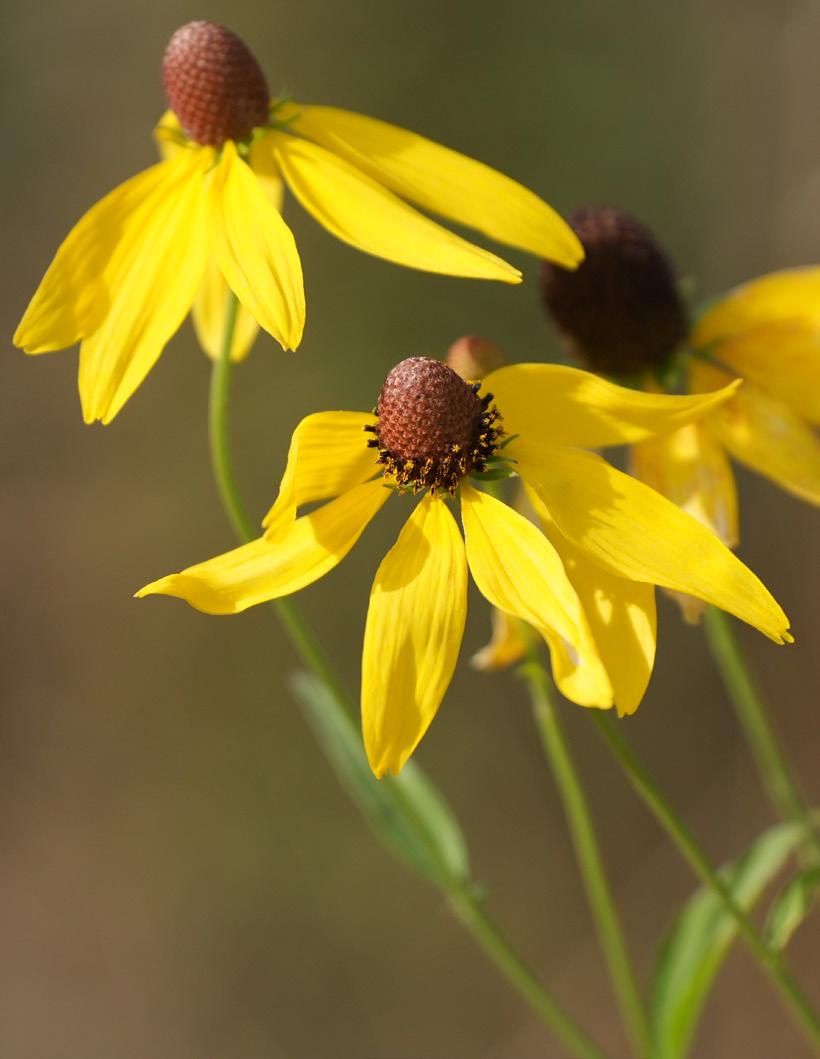

Osher Lifelong Learning Institute
Phone:
Fax: (269)
wmich.edu/olli
Osher Lifelong Learning Institute Western Michigan University 1903 W Michigan Ave Kalamazoo MI 49008-5230 USA
Director’s Message
In celebration of the Osher Lifelong Learning Institute at Western Michigan University’s 10th anniversary, it is only fitting that we acknowledge and thank everyone who has been involved with the establishment of the Lifelong Learning Academy/Academy of Lifelong Learners since its inception in 2011 and then our transformation into the official establishment of OLLI at WMU in 2015.
Volunteers are the heartbeat of OLLI and without them, we would not be the thriving community we are today. It has been said that “volunteers don’t have more time, they just have more heart,” and undoubtedly, this statement is true of our volunteers.
To be an OLLI volunteer means that you are...
• Service-minded and willing to give of your time and talents
• Committed to making a difference that positively impacts others
• Dedicated to furthering OLLI’s sustainability
• Always there to assist and support our lifelong learning community
• The very heartbeat of OLLI at WMU
I know that I speak for everyone on our team when I say that we are extremely fortunate to partner with our invaluable volunteers. We are incredibly grateful for everything you have done, and all that you will continue to do, in support of our OLLI at WMU!
Sincerely,

Toni Woolfork-Barnes Director
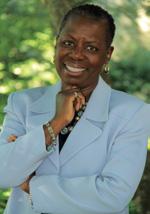
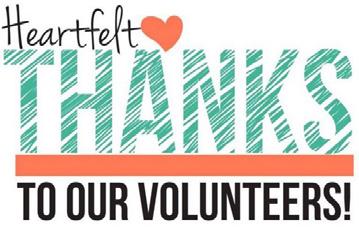
OLLI From the Members
“I liked how the instructor connected the emotional aspects of anime to movie themes that, generationally, we understood better. It helped me see the depth of the anime genre.”
Wayne L. Bond II – “Understanding Anime”
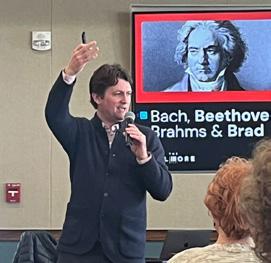
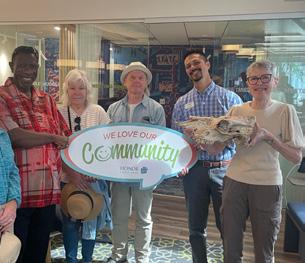
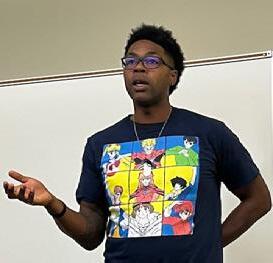
“The presenters were so knowledgeable! The information presented was so interesting and it was great listening to samples of the music performances during their presentations.”
Zaide Pixley, Adam Schumaker, Pierre van der Westhuizen, Seth Abramson – “At the Gilmore: Bach, Beethoven, Brahms, & Brad”
“I enjoyed this class. It was fun learning things about Kalamazoo that really make it an interesting city.
The downtown Kalamazoo walking tour was great as I visited spaces I had never been in before.”
Christopher Hodshire, MSW – “Cool City Initiatives Walking Tour: Aimed at Making Cities More Attractive, Vibrant, and Livable”
“Lynn is an excellent presenter. I was able to introduce a topic for input—solo aging and the challenges it brings— which opened up further discussion. That may lead to a course of action to further assist senior citizens.”
Lynn McFarlen – “Golden Information for Your Golden Years Series: Get to know Milestone Senior Services”
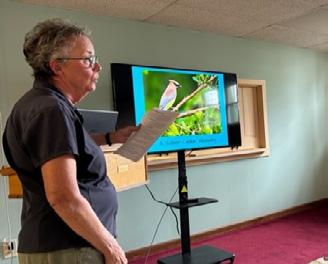
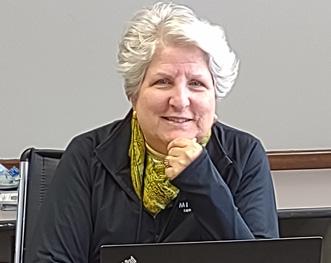
“The instructor was well prepared, had beautiful pictures to support her subject matter, and gave great tips and pointers for those interested in pursuing nature photography.”
Jeanne Church – “Nature Photography: Anybody Can!”
“The presentation was quite informative and up to date, citing research from February 2025.”
Leonard Ginsberg, PhD – “Ancient DNA and Genetics: The Story of Human Evolution”
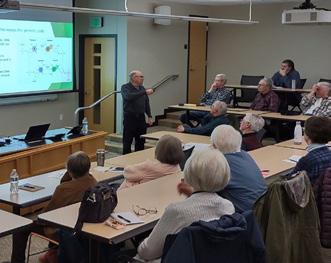
WMU Civility Statement
Western Michigan University is committed to creating and sustaining an environment that honors the inherent dignity and worth of all members of the WMU community. Respectful behavior expressed verbally, textually, visually, and physically should be the norm in all university communications and venues including classrooms, meetings, offices, workplaces, forums, events, social media and residential communities.
As an institution of higher education, we welcome a diverse range of perspectives and opinions and uphold the importance of civil debate. We fully support the free exchange of ideas and beliefs, as well as the expression of provocative or unpopular ideas. It is through this process that we generate knowledge and deepen our understanding of humanity.
Freedom of thought and expression may create conflict, strong emotions, and divergent ideological positions. While these effects are expected and welcomed, all members of the community have a responsibility to behave in a manner that does not harm others nor creates a hostile environment. Behavior that attacks, humiliates, belittles, or conveys hatred towards others diminishes our thriving and safe university environment.
Each member of our academic community is encouraged to be thoughtful and sensitive in their choice of words and behaviors. We should be aware of how our behavior affects others. Furthermore, we carry a responsibility to challenge those who communicate intolerance, hatred and bigotry. Words and actions matter. Everyone is asked to do their part in creating a healthy and positive university community and a culture that truly values each member’s uniqueness experiences, and perspectives.
Membership Information
Why Become an OLLI Member?
Intellectual discovery, personal growth, and social engagement are proven to enrich one’s quality of life, boost health, and contribute to one’s overall happiness. Those who are open to new experiences, actively involved in their communities, and cultivators of curiosity often lead more purposeful and productive lives.
From music to history or the arts to the sciences, the opportunities to expand your worldview and broaden your horizons are endless with OLLI at WMU!
OLLI Membership Fees
Memberships fees are $50 per year and are nontransferable. Our annual renewal date is July 1. Joining OLLI is simple – just head to our website at wmich.edu/olli. If you have questions about membership, call us at (269) 387-4157 or email wmu-olli@wmich.edu.
Keep us growing by becoming a member and by telling your friends about OLLI at WMU! The gift of an OLLI membership also makes an excellent present for friends, family, and colleagues.
Benefits of an OLLI Membership
The Osher Lifelong Learning Institute at WMU is membership-based and open to anyone 50+ with a passion for learning. There are no tests, no grading and no academic credit. Your annual membership fee helps defray costs not covered by our low course fees.
There are many benefits to an OLLI at WMU membership, including:
• 25% discount for most events at the Gilmore Theatre Complex
• 15% discount for most events at Miller Auditorium
• 10% discount for most items at the WMU Bookstore
• Enrollment fee waived at West Hills Athletic Club
• Access to Shared Interest Groups which are member directed
• Member-only events and tours
Course Locations
Air Zoo Aerospace and Science Museum
6151 Portage Rd, Portage, MI 49002
College of Health and Human Services
Western Michigan University - East Campus
Dunbar Hall
Western Michigan University - Main Campus
First United Methodist Church of Kalamazoo
212 S Park St, Kalamazoo, MI 49007
Frederik Meijer Gardens & Sculpture Park
1000 E Beltline Ave NE, Grand Rapids, MI 49525
Friendship Village
1400 N Drake Rd, Kalamazoo, MI 4906
Goodwill Industries of Southwestern Michigan
420 E. Alcott Street, 49001
Heritage Community of Kalamazoo 2300 Portage Street, Kalamazoo, MI 49001
Kalamazoo Public Library
Eastwood Branch 1112 Gayle Ave, Kalamazoo, MI 49048
Lee Honors College
Western Michigan University - Main Campus
Milestone Senior Services
918 Jasper St, Kalamazoo, MI 49001
Parkview Hills Clubhouse
3707 Greenleaf Cir, Kalamazoo, MI 49008
Portage Zhang Senior Center
203 E Centre Avenue, Portage, MI 4900
Sangren Hall
Western Michigan University - Main Campus
Williams Theatre and Shaw Theatre
Gilmore Theatre Complex
Western Michigan University - Main Campus
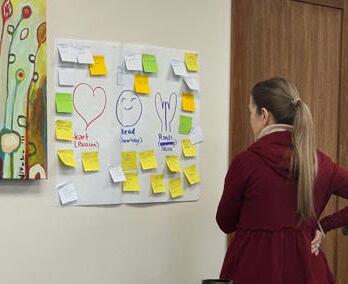
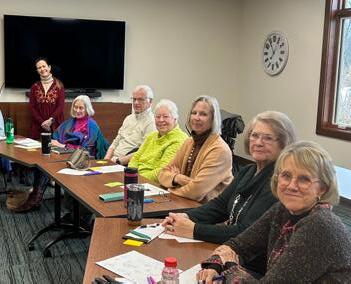
“Drawing Your Future: Navigating Your Next Steps” with Allison Hammond, Ed. D.
General Information and Policies
About the Osher Lifelong Learning Institute at WMU
The Bernard Osher Foundation, headquartered in San Francisco, was founded in 1977 by Bernard Osher, a respected businessman and community leader. The Foundation supports a lifelong learning network for mature adults through their Osher Lifelong Learning Institutes, which can be found on the campuses of 120 colleges and universities nationwide.
The Osher Lifelong Learning Institute at Western Michigan University (OLLI at WMU) takes pride in providing intellectual and cultural stimulation, personal growth, and social engagement for adults 50+ in an informal, lively educational atmosphere. Over the last 10 years, OLLI has offered over 1,200 courses, welcomed more than 1,500 members, been taught by over 450 instructors, and coordinated nearly 70 events.
In addition, hundreds of volunteers have been an integral part of committees and leadership, helping to guide the success of OLLI at WMU. Courses and activities are developed by OLLI members with the support of the staff of WMUx. Members also volunteer as planners, instructors, committee members or advisory board members.
Scholarships
We believe that everyone should have the opportunity to learn. If you are unable to pay for courses, but want to experience what OLLI at WMU offers, why not take advantage of our robust Scholarship Fund?
An individual may apply for financial assistance to pay for one course per semester. The application is short and confidential. Please email us at wmu-olli@wmich.edu or call (269) 387-4157 for more information.
Trip Registration and Fees
Trips will be announced in the monthly newsletter and on our website. Dates and costs vary on a case-by-case basis. OLLI partners with Premier World Discovery to offer opportunities for family and friends to travel together on extended journeys around the globe. Visit wmich.edu/olli/trips to learn more.
Cancellations, Withdrawals, and Refunds
Cancellations: Instructors reserve the right to cancel a class and will notify course participants accordingly. The instructor will work with class members to arrange a make-up session. If you registered for a course and it is canceled, you may receive a refund or apply your course fee to another course if space is available.
If Western Michigan University classes are canceled for any reason, such as inclement weather, OLLI in-person classes are also canceled. It is the participant’s responsibility to consult the WMU website, OLLI website and/or local media regarding weather or other closures.
Withdrawals: You may withdraw from a course by contacting the OLLI office. Non-attendance or notifying solely the instructor is not an official cancellation.
Refunds: You will be eligible for a refund if you withdraw from a course at least two weeks before the first session. If you withdraw from a course less than two weeks before the first session, fees will not be refunded.
Parking Information
For in-person courses held on WMU’s campus, OLLI at WMU pays for your parking. Other course locations do not require permits. Parking permits are emailed or mailed by USPS (upon request) one to two weeks before the first session of your course.
Please let the office know if you already have a WMU permit or a disability parking placard/license plate, as you will not need a parking permit. If no handicapped parking spots are available when you arrive, you may park in any available space with a valid disability placard/license plate, including metered spots (except reserved parking).
Your Photo
When you participate in OLLI at WMU activities (courses, trips, events, etc.) your photograph may be taken and utilized to promote the Institute. Your photo may be used on the website, in our e-newsletter, in brochures, flyers, catalogs or elsewhere. If you do not want your photo to be used it is your responsibility to step out of pictures that are being taken.
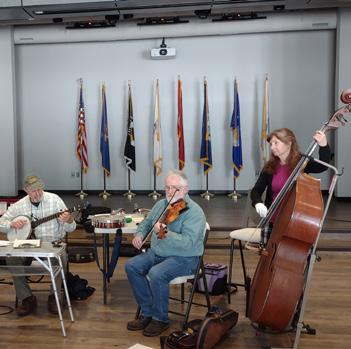
“Live
Music and History Talk Sessions” with Howard Steiner and the Rinktum Ramblers String Band
Volunteer with OLLI
Are you eager to make a significant impact on your community? Do you want to utilize the skills you have developed over a lifetime or discover new ones? Would like to make new friends and social connections? If the answer is “yes” to any of the above, please consider volunteering with OLLI!
Teach a Course
You do not have to be a current or past WMU instructor to teach a course! We welcome past and present instructors from public schools and colleges as well as members of the general community who are passionate about a topic and wish to share their knowledge with others. Got an idea for a topic? Contact us via email at wmu-olli@wmich.edu or visit wmich.edu/olli/become-instructor
Support OLLI at WMU
OLLI at WMU is a membership- and volunteer-driven organization. Even though instructors are unpaid volunteers, the Institute incurs other costs related to course offerings. Subsequently, membership and class fees do not cover all costs associated with operating the Institute. There are also people in the community who are committed to lifelong learning but cannot afford the cost of our courses.
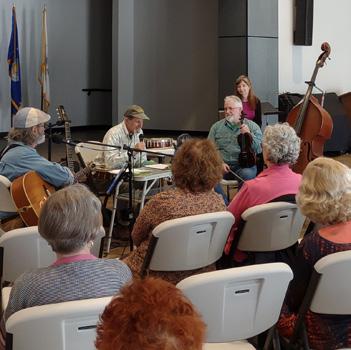
Through WMU’s University Advancement and Alumni Relations Office, we accept donations to either our Operating Fund to support the day-to-day operations of OLLI at WMU, or our Scholarship Fund, which provides free or reduced course registration to individuals who are not able to otherwise participate otherwise.
Visit our website for more information about how you can support OLLI with a financial gift.
Connect with us on Facebook
Stay up to date by liking and following us on Facebook! Search for OLLI at WMU (@WMULifelongLearning) on your Facebook account. Our posts include thought-provoking articles, upcoming details for courses, trips, and events, as well as reviews and photos from programs that have already taken place. You can also use our page to connect with fellow OLLI members, post comments, and share interesting information!
Registration
Registration for the Fall semester opens Wednesday August, 13 at 10 a.m. Courses are offered both in-person and online; course descriptions will indicate delivery method.
Online
Call the OLLI office at (269) 387-4157
Visit room 1530 in Ellsworth Hall on Western’s main campus
Ways to Register
Please note that there will be limited “phone-in registration” for the Fall 2025 semester. Registering online is the quickest way to secure your spot for the courses you want to take. If you need assistance doing so, email us at wmu-olli@wmich.edu or call (269) 387-4157. If you have a visual or auditory disability, please make the OLLI at WMU office aware and we will do our best to accommodate your needs.
Trip Registration and Fees
OLLI has partnered with Premier World Discovery to offer opportunities for family and friends to travel together on extended journeys around the globe. Visit wmich.edu/olli/trips to learn more.
Course Fees
Current fees are based on $10 per session for members and $20 for non-members. Other fees may apply.
If you register by mail, over the phone, or online you will receive registration confirmation and a receipt of payment via email. If you do not have an email address on file, you will receive your confirmation by postal mail upon request.
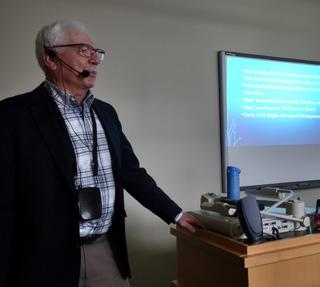
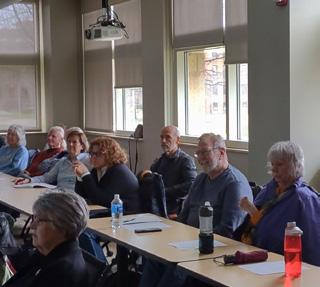
“Turbulent
9 OLLI at WMU
Decade: A History of the 1960s” with Ron Kramer
Online Registration
Browse this Catalog
Click the ‘Click Here to Register’ button
Click Here to Register
Sign In to Existing Account Create a New Account
*Remember, members enjoy the lowest course fees and other benefits. Add a Membership to your cart if you have not yet renewed your annual membership.
Course Selection
Under Courses, click on the link for the appropriate starting month for your desired course
Browse for your desired course and click the ‘Add to Cart’ button
When you finish making all your course selections, click Cart to Checkout

Checkout and complete your transaction
For virtual courses, online access links will be sent to you prior to your course start date
For on campus classes, parking passes will be emailed a week before your course start date, if needed
August 2025 Courses
Biomedical Ethics
Dave Paul, Tues and Thurs 8/28 through 12/11. 10 to 11:40 a.m.
2101 Dunbar Hall, Western Michigan University
Discover the history of medical ethics in the United States as we examine many of the challenging ethical dilemmas faced by doctors, nurses, and other care providers. We’ll discuss diverse topics, including genetic and reproductive technologies, end of life care, AI in medicine, the conflicts between protecting patients’ health while safeguarding their autonomy, and more.
Introduction to Philosophy
McGwire Hidden, Tues and Thurs 8/28 through 12/11. 10 to 11:15 a.m. 1014 Lee Honors College, Western Michigan University
Join undergraduate students in the Lee Honors College to explore great readings in philosophy! Together, you will read and reflect on influential works by philosophers like Plato, Aristotle, Descartes, and more. This introductory course offers a unique opportunity to participate in crossgenerational discussions around life’s “big questions” while exploring new perspectives on the classic “big ideas” commonly associated with philosophy.
Human Flourishing and the Pursuit of Happiness
Dini Metro-Roland, Tues and Thurs 8/28 through 12/11. 12:30 to 1:45 p.m.
4725 Sangren Hall, Western Michigan University
What is human flourishing? Drawing from philosophy, literature, and the social sciences, we will examine conceptions, visions, and conditions of human flourishing, its changing nature across the span of Western history, and its manifold expressions in contemporary life. While we can’t possibly do justice to this thorny question in all its complexity, we can explore a variety of its relevant philosophical concepts, literary visions, and grounded conditions. We’ll approach this subject through a threefold lens of philosophical conceptions, literary visions, and grounded conditions. First, students in this class will read and discuss various philosophical texts from our history that explore the multifaceted theme of human flourishing. Then, we’ll explore a vivid and fruitful way to entertain this enduring question by viewing human flourishing through the lens of art and literature. Students will be assigned several works of literature that explore the topic of human flourishing from a variety of unique perspectives.
:
The third aspect to our investigation of human flourishing is to understand how our concepts and visions are applied in practice by participating in experiential exercises designed to heighten our understanding of various concepts of flourishing. Students are responsible for acquiring and/or purchasing the following texts we’ll use in class: Haybron, David. “Happiness: A Very Short Introduction.” Oxford University Press, 2013.; McBride, James. “The Color of Water: A Black Man’s Tribute to His White Mother.” RB, 2006.; and an additional novel that will be chosen as a group.
September 2025 Courses
Outstanding Contemporary Sculpture in Our Own Backyard
Phil D. VanderWeg, Wed 9/3 10 a.m. to Noon 2510 Sangren Hall, Western Michigan University, and 9/10 11 a.m. to 4 p.m. Frederik Meijer Gardens & Sculpture Park
In this two-session course, you’ll develop a deep understanding of the professional art standing and importance of the Grand Rapids Meijer Gardens and Sculpture Park as we examine the fundamental issues and concerns of permanent sculpture. The first session takes place in the classroom, where we’ll study an overview of the Meijer Sculpture Garden that contextualizes its significance, collection, and role as an art institution. We’ll then compare Meijer Gardens with similar institutions and see how they have evolved in the professional art community. Afterward, we’ll learn about the Contemporary Bust Sculpture that will be on exhibit in the interior gallery and answer questions about the various pieces on display. In the second session, we head outdoors to explore the Meijer Sculpture Gardens in Grand Rapids first-hand, where we’ll tour the Contemporary Bust Sculpture exhibit, take a break for lunch (there is a cafe onsite with items for purchase if you like or bring your own), then hop on a tram ride to view the outside collection pieces.
Please ensure that you come to the second session dressed for the weather and prepare for extensive walking. Meijer Gardens is wheelchair accessible; they usually have a number of open free wheelchairs available at the entry point to the facility from the parking area as well as in the check in area. Wheelchairs can be taken from the inside venue to the tram departure area. Additionally, there is extensive handicap parking and a drop-off area.
September 2025 Courses
Students will need to provide their own transportation to and from Meijer Gardens and Sculpture Park in Grand Rapids. They will also need to purchase an admission ticket and tram ticket on their own.
Financial Health and Wellness
Andrew Brasosky, Wed 9/3 through 9/24. 1 to 2:30 p.m. 2510 Sangren Hall, Western Michigan University
There are many aspects of well-being—but did you know that financial health is one of them? This course examines financial habits from a holistic perspective that offers meaningful insights and guidance for moving forward. We’ll discuss important questions related to money management, examine the impact of healthcare costs, learn how to leverage retirement funds effectively, discover strategies to outsmart scammers, and more.
Where on Earth Is the U.S. 2025: A Top 10 Review
Douglas W. Stowell, Thurs 9/4. 10 to 11:30 a.m. Online via Webex
How does the United States compare globally in meeting the challenges that exist in 2025? The “Top 10” format of this course will provide a quick “snapshot” of how the United States ranks relative to other nations. Using international surveys by highly credible and impartial world-wide organizations as our sources, we will examine at least 24 topics—including GDP, Wages, Taxes, Trade balances, Tariffs, Environment, Energy, Education, Healthcare, Climate Change, Immigration, Safety, Prosperity, Personal Happiness, and many more. A complete PDF copy of these findings will be supplied to students for review in advance of the course.
Dancing Together: Squares and Contras
Carol Steiner, Thurs 9/4 through 10/2. 1:30 to 3:30 p.m.
First United Methodist Church of Kalamazoo
Come build your confidence, get some exercise, and have a great time with new friends by learning traditional American dance forms! These social dances are gentle on the body and use familiar moves that are easy to pick up on, such as dosidos and allemandes. There’s nothing to memorize, no need to bring a partner, and no leads or follows. You’ll learn all of the moves step-by-step, then each dance will be “called” as we come together to dance to recorded music. If you’ve been looking for a fun way to stay active and can move easily at a comfortable walking pace, this is the class for you!
And don’t worry, you won’t need frilly dresses or cowboy boots—those are for old movies and reruns of “Hee Haw”—but contras and squares are aerobic so remember to wear light weight clothing, comfortable shoes, and bring a water bottle to stay hydrated.
Five Secrets to Living Life to the Fullest
Jennifer Clark, Mon 9/8. 10 a.m. to Noon 2510 Sangren Hall, Western Michigan University
What’s the secret to living a fulfilling life? We live in an imperfect world, and we are all imperfect creatures. So, in the midst of distractions and everyday challenges, how can we live as authentically as possible? In this course, you’ll be introduced to various individuals who, despite their flaws, figured out their own unique path to wellbeing. Ranging from inspirational to outrageous, we’ll learn through artwork and the instructor’s research how these fascinating people who, despite their flaws and struggles, managed to live full, rich lives. By learning their stories and unlocking their secrets, we’ll discover more about our own selves and how we can live an even more creative, generous, and courageous life—even in the face of difficulties.
A History of the Kalamazoo Psychiatric Hospital
Marge Kars, Thomas Dietz, Lynn Houghton, Sharon Carlson, and Dr. Ann Chapleau, Tues 9/9, 9/16, and 9/23. 10 a.m. to Noon 1035 College of Health and Human Services, Western Michigan University
Moderator Marge Kars and four instructors will lead this in-depth, three-session course that comprehensively explores the history of the Kalamazoo Psychiatric Hospital. The first session will cover why a psychiatric hospital was considered for Michigan and why it was built in Kalamazoo. We’ll also analyze the influence of Dorthea Dix in creating the first psychiatric hospitals in America and the built environment of the hospital along with the farms and cottages. This session will examine the hospital’s history up to 1900. The second session will cover how the psychiatric hospital influenced the city of Kalamazoo, the water tower, the tuberculosis hospital, and the ultimate dismantling of the facility’s campus in 1980s. The final session will tell the stories two women who influenced treatment at the hospital—Linda Richards, Superintendent of Nursing at the hospital and the first graduate of America’s first school of nursing; and Marion Spear, who led the development of occupational therapy at the hospital and the move to medication therapy.
September 2025 Courses
Building Foundations of Caregiving
Shukurani Nsengiyumva, Wed 9/10. 10 to 11:30 a.m.
Online via Webex
In this course, you’ll learn a person-centered approach to caregiving, how to reduce caregiver stress, and how relationships can change over time throughout the caregiving journey.
Ranked Choice Voting: Creating a New Election System for Michigan
Alex Perrin, Fri 9/12 and 9/19. 10 to 11:30 a.m.
Online via Webex
How do we vote and why does it matter? In this nonpartisan, two-session course, we’ll examine our current election system and compare it to other systems both in theory and how they work in the places that use them. We’ll then walk through the process of how we can upgrade our current voting system to an alternative method—such as Ranked Choice Voting—and the approach implementing it in Michigan. First, we’ll discuss what makes a good voting system before reviewing common alternatives, such as Plurality, Ranked Choice Voting, Condorcet, STAR, and many others. We’ll also analyze the history and purpose of political primaries and straight ticket voting. In the second session, we’ll examine Michigan’s current election mechanisms and voting reform policies that are being considered before comprehensively exploring the ins-and-outs of Ranked Choice Voting, including its pros and cons, comparison against other alternative systems, and the process of advocating for and implementing constitutional amendments that are aimed toward improving the voting process for all.
Golden Information for the Golden Years Series: Women’s Heart Health
Susan Mastenbrook NP-C, Tues 9/16. 10 a.m. to Noon Milestone Senior Services
Heart disease is the leading cause of death in women— accounting for more deaths than all types of cancer combined. Despite this, women are often less likely to be diagnosed and treated for heart disease than men. This class will focus on learning how to keep your heart healthy and how to recognize if you need help. Although this class is geared toward women’s heart health, men are encouraged to attend.
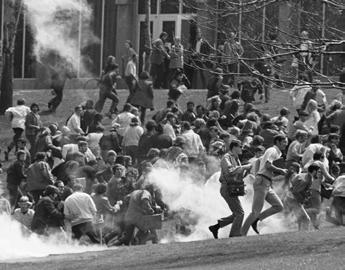
Turbulent Decade: A History of the 1960s
Ron Kramer, Tues 9/16 through 10/7. 3 to 5 p.m.
2510 Sangren Hall, Western Michigan University
This course provides a comprehensive history of the 1960s, analyzing the social and political impacts of this turbulent decade first through the contextual lens of post-World War II American culture and events between 1945 and 1960 before pivoting our focus to the “Long Sixties” from 1960 to 1974. Setting the stage with the impact of the atomic bomb and the beginning of the Cold War, the 60s saw an intense reevaluation of our country’s ideologies through the birth of the Civil Rights and Antiwar movements; the rise of feminism and environmentalism; and backlash against the murders at Kent State, increased violent crime in urban areas, and overwhelming corporate commercialization. Politically, Kennedy’s New Frontier, Johnson’s Great Society, the emergence of the New Left, and Nixon’s Watergate scandal all introduced new perspectives, challenges, and problem-solving attempts. American society also experienced an incredible cultural shift through the development of a Youth Counterculture, the influence of television, the transformation of the musical landscape by Beatles and rock music, and the optimistic spirit gained from the moon landing. Returning with added depth, this course expands on the Winter/Spring 2025 session to provide an even more comprehensive look at the era.
Dinergy: One Way Nature Can Help Us Solve Our Problems
Robin A. Skitt, Wed 9/17 and 9/24. 4 to 6 p.m.
Clubhouse Keystone Room, Friendship Village
We must find ways to preserve our environment for current and future generations—and this course will explore one of the basic modes of operation used by nature to maintain a space conducive to all life—the balancing of opposing forces. Nature continuously balances the needs of plants and animals, predators and prey, the amount of oxygen and carbon dioxide in the air, and innumerable other pairs. Yet, as Gregory Bateson puts it, “the major problems in the world are the result of the difference between how nature works and the way people think.” Dinergy is the application of this natural pattern to human thinking with the goal of generating harmonious interactions that will provide for all life on this planet, both human and non-human. We’ll also discuss the benefits and synergies of holism and reductionism. Reductionism is based on the notion that reality is much like the “clockwork” universe identified by Newton and has been the primary scientific approach since his time; meanwhile, holism observes that the whole is made from relationships, not individual members, and the interactions between members of the system are critical to the outcomes. To do any complete science as viewed from dinergy’s balance-centric lens, both of these viewpoints must be included in our study.
Civic Scribes: An Introduction to Observing and Reporting on Local Government Meetings
Reid Williams and Ben Lando, Fri 9/19. 1 to 3 p.m.
MCLC Auditorium, Heritage Community of KalamazooI and Tues 9/23. 3 to 5 p.m.
Road Commission of Kalamazoo County
Discover how you can actively strengthen local democracy through informed citizenship by becoming the eyes and ears of our community! This two-session course will teach you how to report on government meetings, comprehensively equipping you with all the skills and knowledge you need to observe, document, and clearly communicate the decisions that directly impact our community with the local nonprofit news organization, NowKalamazoo. No prior journalism experience necessary—just bring your curiosity and civic spirit!
In the first session, you’ll learn the foundations of journalism and the essentials of covering government meetings, including identifying newsworthy decisions and discussions; taking effective notes that capture key information; navigating meeting agendas, minutes, and supporting documents; understanding the Open Meetings Act and Freedom of Information Act laws; and ultimately crafting clear, factual news briefs that inform your neighbors. In the second session, you’ll put your newfound knowledge into practice with a guided field trip to an actual local government meeting. The group will attend the County Road Commission meeting on Tuesday, September 23 at 3 p.m. at 4400 S 26th Street, Kalamazoo, MI. There will also be the option to watch this meeting via Public Media Network or via Zoom. You’ll observe proceedings firsthand, take notes alongside experienced reporters, and draft a practice news brief with professional feedback. This hands-on seminar provides a meaningful way to contribute to helping our community hold governments accountable while developing invaluable communication and critical thinking skills. Upon completion, you’ll have the opportunity to join our nonprofit’s volunteer reporting network, helping ensure local decisions receive the coverage they deserve and that our community has the information they need to succeed.
The Polarization of Social Media: How We Fall Victim to the Algorithm
Madison Watland, Mon 9/22. 2 to 4 p.m. Online via Webex
In today’s world, social media is a major source of news and information for many people. But have you ever wondered how the things you see are selected? This course takes a closer look at how social media platforms use “algorithms”—specific instructions designed by a computer programmer—to decide what content shows up in your feed and how these algorithms shape our thoughts, emotions, and behaviors. With social media consumption at an all-time high, algorithms have a powerful effect on how we interact with the world and each other. We’ll explore how algorithms can create echo-chambers, limiting the variety of perspectives we encounter, and how they often prioritize more extreme or emotional content to capture our attention. You’ll also learn how algorithms impact the way we view society, and why it’s important to be aware of their influence on our understanding of reality. Along the way, we’ll consider the responsibilities of social media companies and how we can better navigate online spaces to protect the well-being of ourselves and others.
September 2025 Courses
Empowered Caregiver Series: Supporting Independence
Shukurani Nsengiyumva, Wed 9/24. 10 to 11:30 a.m.
Online via Webex
The Alzheimer’s Association is committed to supporting a dignified experience for individuals with dementia while promoting the well-being of family caregivers. Students will learn how to best help a person living with dementia take part in daily activities, how to provide the right amount of support, and balance safety with independence while managing expectations.
A Glimpse Into Deep Space: Discovering Black Holes, Exoplanets, and a New Frontier
Erin Lewis, Thurs 9/25. 10 to 11:30 a.m.
Air Zoo Aerospace & Science Center
Over 30 years have passed since the launch of the Hubble Space Telescope and the secrets of our Universe began to come to light. The first exoplanets were also discovered in the early 90’s, inviting us to speculate further about what we might find in other solar systems. Today, we have the tools to see beyond what Hubble showed us and truly explore the atmospheres of exoplanets, delve into the details of ancient galaxies, and even take images of black holes! Discover how far we’ve come in just three decades and learn about the latest equipment astronomers are using, including Near-Infrared imaging and Spectroscopy, that lets us see farther into deep space than ever before.
Empowered Caregiver Series: Effective Communication Strategies
Shukurani Nsengiyumva,
Option 1: Thurs 9/25. 12:30 to 2 p.m. Vicksburg Senior Center
Option 2: Wed 10/8. 1:30 to 3 p.m. Kalamazoo Public Library Eastwood Branch
The Alzheimer’s Association is committed to supporting a dignified experience for individuals with dementia while promoting the well-being of family caregivers. In this course, we’ll explore how dementia impacts communication and discover effective strategies for engaging with family, friends, and healthcare professionals.
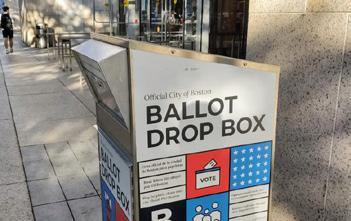
Election Administration and Security
Meredith Place, Thurs 9/25. 1 to 3 p.m.
MCLC Auditorium, Heritage Community of Kalamazoo
Recent changes to Michigan election laws coupled with concerns regarding accuracy at the ballot box has led to confusion among voters—and in this course, you’ll walk away with a sense of clarity and better understanding about the checks and balances built into our election process. You’ll learn about the processes local election administrators use to conduct safe, secure, and accurate elections, as well as how inspectors are trained to administer a polling location and safeguard the integrity of these spaces. We’ll also examine the technology used to count votes, chain of ballot custody, the mechanics behind tallying election results, and more.
Artificial Intelligence: What Is It, and Why Does It Matter?
Winston Smith, Fri 9/26 and 10/3. 3 to 5 p.m. Online via Webex
Artificial Intelligence has become somewhat of a buzzword in modern society, but many people are left unclear on what it really is and what it is capable of doing. This beginnerfriendly course will provide a basic overview of what AI is, what it can do, and perhaps most importantly, what it can’t do. You are not required to have any background in coding, computer science, or technology, and this course will not teach you how to code or make AI. Instead, we will focus on how to see through the hype around AI and make informed decisions with Artificial Intelligence in mind. Additionally, because AI is a very hot topic among the scientific community that continues to rapidly develop, we will also discuss some speculations about what advancements we are likely to see in the near future. No external materials will be required unless they are provided at no charge by the instructor. : Repeat
October 2025 Courses
Drawing Your Future: Navigating Your Next Steps
Allison Hammond Ed.D, Thurs 10/2. 10 a.m. to Noon Meeting Room 1B, Portage Zhang Senior Center
Come learn a new way to plan for the life you want to live as you age through Visual Facilitation! This course will teach you new ways to consider planning for your later years of life. Many people have made financial plans, chosen a power of attorney, and other technical things that need to be in place for smooth transitions as they age, however, many families have not had intentional conversations about the wishes of their elders or how family members can support them. You’ll learn about a simple visual tool called a Solution Circle that you can use to facilitate your own future planning with family and friends.
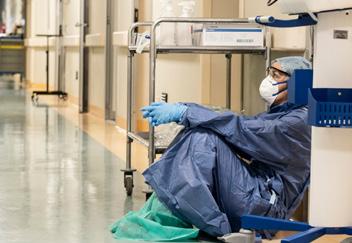
COVID-19: The Lasting Impact of a Pandemic
Gillian Stoltman Ph.D. MPH, Thurs 10/2 and 10/9. 1 to 3 p.m.
2510 Sangren Hall, Western Michigan University
COVID-19 was the most significant pandemic of the last hundred years in terms of its speed of spread, number of lives lost, and lives permanently altered. The impact of this illness not only involved our health but also many other aspects of our day-to-day existence. While all nations were affected, their governments and people responded very differently, often with divergent outcomes. We’ll explore how this disease may have originated, the many ways individuals and countries responded to the crisis, and how “Long COVID” is still affecting so many people two years after the pandemic ended in May 2023.
The Biggest Village in the USA: Kalamazoo 1828-1884
Thomas Dietz, Mon 10/6, 10/13, and 10/20. 10 a.m. to Noon
2510 Sangren Hall, Western Michigan University
This course will examine the history of Kalamazoo from its settlement until it became an incorporated municipality in 1884. By then, it had grown substantially but had retained its village form of government, earning it the nickname, “The Biggest Village in the USA.” We will learn about the original inhabitants of this region, the pioneering founders of the village, and the reasons for its success and growth. The course will also explore Kalamazoo’s industrial, cultural, and political landscape throughout 1828 to 1884.
Counterfactual Thinking: Estimating What Could Have Been
John F. Akwetey MSc, Mon and Wed 10/6 and 10/8. 1 to 3 p.m. Fri 10/10. 2 to 3:30 p.m.
1284 College of Health and Human Services, Western Michigan University
In this course, we’ll embark on an engaging and insightful journey into the realm of counterfactual thinking, as we learn how to analyze hypothetical alternatives to past events and decisions. Through interactive discussions, case studies, role-playing scenarios, and group exercises, you’ll gain a deep understanding of how counterfactuals are applied across various fields, including history, psychology, and evaluation. This course also offers practical tools for estimating what could have been, equipping students with invaluable skills that’ll help them comprehensively consider real-world scenarios from multiple angles—such as the outcomes of social policies or historical turning points. Additionally, you’ll discover how to apply these techniques in your professional or academic work, thereby amplifying your decision-making and analytical skills. The course does not require students to purchase additional materials; all resources and readings will be provided digitally at no extra cost.
: Repeat course within the previous year

Decluttering for Seniors
Niki N. Nimmo MAT RN, Tues 10/7, 10/14, and 10/21. 10 a.m. to Noon Clubhouse Classroom, Friendship Village
Decluttering websites and books tell us to divide things into “keep” or “donate” piles and suggest tons of other tips and tricks about how to better organize. But after living such long lives with our homes and belongings, it’s never this simple—emotions, commitments, and our identities get in the way. This multi-session course will focus on how we can meet the task of decluttering without feeling deprived of memories or pressured to drop down to the bare necessities. We’ll explore the best questions to ask ourselves while discovering how to distinguish between life treasures and mere possessions carrying memories that are no longer relevant to today.
What Does a Director Do?
D. Terry Williams Ph.D,
Option 1: Thurs 10/9. 2 to 4 p.m. 1035 College of Health and Human Services
Option 2: Thurs 10/16. 2 to 4 p.m. 1057 College of Health and Human Services
Western Michigan University
Unlike conductors who stand in front of an orchestra and wave a baton, stage directors do not appear on stage—they are invisible artists whose work is done when the curtain goes up on opening night. So, what exactly does a director do and how do they do it? What is the director’s role in the rehearsal process? Where do they get their training? What makes for a successful director? These, and other questions about life in the day of a director, will be explored. Note: this course will be offered twice this semester; students should register for only one section.
Live Music and Discussion: African American Roots of American Country and Cajun Music
Howard Steiner and Band, Fri 10/10 and 10/24. 1 to 3 p.m.
2089 College of Health and Human Services, Western Michigan University
History comes alive through music in this unique course featuring an acoustic string band that will perform and discuss popular American “old time tunes” that were directly influenced by the cultural interchange between European colonists and African Americans, both enslaved and free. You’ll hear examples of songs that were profoundly shaped by the musical traditions brought to North America by people from Africa, highlighting the contribution of syncopation in particular. We’ll explore the role of the African “banjar,” or spiked lute, alongside the fiddle, demonstrating the ways these instruments influenced key elements of both dance and popular music. We’ll also compare and contrast these songs with European music that was popular at the time of cultural contact in the early years of the United States. This course takes a musical tour through time, featuring performances of historic tunes from Appalachia, the Minstrel era, ragtime, work songs, and early blues.
Capturing and Sharing Stories With Your Phone
Lem Montero, Wed 10/15 and 10/22. 2:30 to 4 p.m. Meeting Room 1A, Portage Zhang Senior Center
Everyone has a story to tell, and today’s mobile devices make it easier than ever to capture and share them. Whether you want to document family history, create personal reflections, or capture community experiences, this interactive two-session course will teach you how to produce high-quality video recordings with minimal equipment. You’ll learn simple techniques to record, edit, and preserve stories using an iPhone, which will be provided for students to use during class. We’ll also explore best practices for interviewing, capturing clear audio and video, and using mobile apps to enhance and edit your recordings. By the end of this course, you will know how to record a video story to share with family, friends, or even contribute to community storytelling initiatives like Public Media Network’s Amplify Kalamazoo. No prior technical experience is required—just curiosity and a willingness to explore new ways to share stories and preserve experiences! Hands-on practice will be included in both sessions.
Why Women’s Clubs Mattered —and Still Do!
Sharon Carlson, Thurs 10/16, 10/23, and 10/30. 10 a.m. to Noon 2089 College of Health and Human Services, Western Michigan University
For over two centuries, women’s clubs in Michigan have contributed to hospitals, libraries, and host of other philanthropic areas. Beginning with the Ladies’ Protestant Orphan Association that formed in Detroit in 1818 and throughout the twentieth and twenty-first centuries, these clubs provided opportunities for members to enrich their lives and improve the communities around them. This course will look at the wide range of women’s clubs that have existed in Michigan and some of their lasting contributions.

Understanding Anime
Wayne L. Bond II, Thurs 10/16. 2 to 4 p.m. 1035 College of Health and Human Services, Western Michigan University
What was once an isolated fad beloved by quiet individuals, anime is now a global phenomenon. This course will serve as a thematic introduction to the art form of anime, how anime culture has grown within the United States, and how it is broadly viewed by millennials and Gen Zers. While this course is not meant to answer every question one may have, it presents the themes that have captivated multiple generations within the West, and you’ll walk away with a better understanding of why millions worldwide fell in love with the whimsical and wonderful world of anime.

Classical Grandeur and Victorian Beauty: The Art and Architecture of the Michigan State Capitol
Valerie Marvin and Shayla Croteau, Mon 10/20 and 10/27. 2 to 4 p.m. 2510 Sangren Hall, Western Michigan University
In 1992, Michigan’s Capitol was named a National Historic Landmark—the highest honor accorded to American buildings—due to its unparalleled architecture and art. In our first session, we’ll dive into our Capitol’s architecture, including its ties to ancient Roman temples, early American capitol buildings, and the U.S. Capitol. We’ll also examine architect E.E. Myers’s role in establishing cast iron domes as symbols of American democracy in the post Civil War world, as well as learn about the importance and applications of nineteenth century technologies, including cast iron and industrial plate glass. During our second session, we’ll journey through the fine art of the Michigan State Capitol! We will discuss artistic styles and techniques present in our portrait collection, learn more about the artists behind the masterpieces, and try our hand at visual analysis.
Golden Information for the Golden Years Series: Medicaid and Medicare 102—
Beyond the Basics
Miranda Pearson LLMSW, Tues 10/21. 10 a.m. to Noon Milestone Senior Services
Join us for Medicare and Medicaid 102, a course intentionally designed for those who want to expand their understanding of coverage options, costs, and enrollment strategies. We’ll take a deep dive into the Medicare program as we explore how to navigate Medicare Advantage, Medigap policies, and prescription drug plans, as well as discover ways you can maximize your benefits while avoiding common pitfalls. Whether you’re approaching eligibility or already enrolled, this course will provide invaluable insights to help you make informed healthcare decisions moving forward.
October 2025 Courses
The Inside View: How the Radiologist Guides Diagnosis and Treatment
Kathy Gadwood, MD, Wed 10/22 and 10/29. 10 a.m. to Noon Meeting Room 1A/1B, Portage Zhang Senior Center
The discovery of the x-ray in 1895 forever changed how we diagnose and treat patients. Many new imaging modalities are now available to radiologists and care providers, such as CT, ultrasound, nuclear medicine, MRI, PET scans, and several others. We’ll explore the history of these technologies, as well as explain the different types of exams, and why one or more studies may be preferred in various clinical situations. For example, interventional radiology goes beyond diagnosis to actually treat the patient in some circumstances. Many images will be shown to emphasize how diagnostic radiology is essential in the evaluation of trauma, pain, infections, cancer, pregnancy, and neurological problems, as well as in screening of currently healthy people. You’ll walk away from this class with both an increased understanding of the entire process of radiology and medical imaging and equipped with invaluable information needed to navigate medical reports, your electronic records, and much more.
Understanding and Responding to Dementia-Related Behaviors
Shukurani Nsengiyumva, Wed 10/22. 1:30 to 3 p.m. Kalamazoo Public Library Eastwood Branch
The Alzheimer’s Association is committed to supporting a dignified experience for individuals with dementia while promoting the well-being of family caregivers. In this course, we’ll learn about common behavior changes in dementia, explore non-medical strategies for managing these behaviors, and recognize when additional support may be needed.
Shakespeare Adaptations: “The Tempest”
Savannah Xaver Ph.D, Wed 10/22, 10/29, and 11/5. 2 to 4 p.m. 2510 Sangren Hall, Western Michigan University
In this three-session course, we will explore the intricacies of Shakespearean adaptation by examining and discussing the strategies, processes, and patterns used to adapt “The Tempest.” First performed in 1611, Shakespeare’s final play is a complex one; featuring themes like aging, gender, magic, colonialism, and more, adaptations of “The Tempest” have a multitude of interesting—and even, sometimes, downright weird—characters, settings, and lines to embrace. Using the 2010 film starring Helen Mirren as a gender swapped Prospera as our starting point, we will
discuss the principles of adaptation, dominant patterns surrounding adaptations of “The Tempest” specifically, and our own expectations, challenges, and perspectives as audience members. We will base our discussions on the original text, so some previous knowledge of “The Tempest” is preferred.
The History and the Literature: “The Curse of Pietro Houdini”
Diane and Stan Henderson, Fri 10/24. 11 a.m. to 1 p.m.
Community Room West,
Portage Zhang Senior Center
Historical novels tell interesting stories about a time and its people, requiring authors to do extensive research to ensure that their writing accurately reflects these past experiences. Using the lenses of art and war, “The Curse of Pietro Houdini” by Derek B. Miller will serve as the foundation for a one-hour lecture on St. Benedict’s storied Montecassino Abbey during World War II. This centuriesold bastion of faith played a major role in German efforts to control the artistic treasures of western civilization and became the center of the defining battle for control of the Italian peninsula in 1944. In the second hour of this course, we will continue with a discussion of the novel as contemporary literature. Avid readers and history buffs alike are welcome! Students should read “The Curse of Pietro Houdini” by Derek B. Miller before class.
Women in Air and Space: Pioneering Women in Early Flight
Amy Walker, Thurs 10/30. 10 to 11 a.m.
Air Zoo Aerospace & Science Center
Dive into the riveting stories of three trailblazing women— Katharine Wright, Bessie Coleman, and Katherine Chung— who defied societal norms to make their mark in early aviation. Katharine Wright, a driving force behind the success of her famous brothers; Bessie Coleman, the first African American woman to earn a pilot’s license; and Katherine Chung, a pioneering Asian American aviator, each overcame unique challenges to contribute significantly to the history of flight. This course explores their indomitable spirits and groundbreaking achievements, shedding light on their enduring legacies that expanded opportunities for women in aviation and left an indelible mark on aviation history. This course will be held at the Air Zoo at no additional charge, but if students wish to explore the museum before or after the program, admission will be required. :
The History of Life on Earth
Randy Schau, Mon 11/3 and 11/10. 10 a.m. to Noon. 2510 Sangren Hall, Western Michigan University
Earth is home to an amazing diversity of life—with over a million species of plants and animals—but those that are alive today represent only 1% of the total that have existed during Earth’s long history. This two-session course will provide an overview of the 99% that have come and gone: from bacteria to trilobites to the first amphibians to dinosaurs to woolly mammoths. Through hundreds of slides, we’ll learn about creatures like smilodons, aminoids, sauropods, and eoraptors, as well as the Pangean supercontinent. We’ll also discuss the remarkable ways how, in spite of each of Earth’s five major “extinction events” killing off more than 75% of then-existing life, enough creatures survived to provide the genetic material for the next round of flora and fauna to flourish.
Journey Back to 1813 New Orleans: Diving Into Marcus Gardley’s Play “The House That Will Not Stand”
Dwandra Nickole Lampkin, Mon 11/3 and 11/17. 1 to 3 p.m. Williams Theatre and Shaw Theatre, Gilmore Theatre Complex, Western Michigan University
In this two-session class led by actress and professor Dwandra Nickole Lampkin, students will explore Marcus Gardley’s powerful play, “The House That Will Not Stand.” The first session offers an introduction to the play, examining its historical context, themes, and the cultural significance of its setting in Pre-Reconstruction New Orleans. Students will also engage in a conversation with some of the production’s designers, gaining insight into the creative process behind bringing the play to life. In the second session, you’ll experience a behind-thescenes tour of the set followed by a post-show discussion led by Professor Lampkin, where students can reflect on the production’s impact, themes, and design elements. As the tour may involve walking and standing for extended periods, we recommend dressing comfortably. This immersive class provides a unique opportunity to deepen your understanding of both the play and the theatrical process, making it ideal for theater enthusiasts and those seeking a closer connection to contemporary drama. Students must purchase tickets on their own through the WMU Theater Department’s Box office; it is highly encouraged to attend one of the performances on November 14 or 15 at 7:30 p.m. or on November 16 at 2 p.m. Performances will also take place November 20 through 23.
Bravo Brahms! Symphony No. 1 by Johannes Brahms With the Kalamazoo Symphony Orchestra
Jane Rooks Ross, Tues 11/4 and 11/11. 10 a.m. to Noon 2510 Sangren Hall, Western Michigan University
The First Symphony of Johannes Brahms is filled with soaring melodies and rich harmonies that are imbued with Romantic passion within an expanded Classical structure. This magnificent piece will be featured in the Kalamazoo Symphony Orchestra’s concert on Saturday, November 15. Beforehand, we will explore Brahms’s Symphony with listening maps, excerpts, and insights, and by showtime, we will be thoroughly familiar with this remarkable masterpiece. In addition to two class sessions, you will be invited to join a KSO rehearsal a few days prior to the concert as an optional behind-the-scenes opportunity; attendance at the KSO’s performance on Saturday, November 15 is strongly encouraged for the full experience. Concert tickets are sold separately; call (269) 387-2300 or purchase online at www.KalamazooSymphony.com.
Preparing for Death:
Leave No Stone Unturned
Sue Caulfield, Tues 11/4, 11/11, and 11/18. 1 to 3 p.m. Meeting Room 1B, Portage Zhang Senior Center
Students in this course will be introduced to a variety of topics that one might wish to address in preparing for the eventuality of death. Rather than approach this as a taboo or morose topic, the course will focus on identifying important topics and issues that one wishes to be honored both before and after dying. These topics include legal documentation and considering if one wants a service and, if so, what kind of service. We’ll also think about some questions. Does one want to write their own obituary? Are there people one hopes to be present when near death? Or are there people one does not want to be present at that time? Overall, the theme of this course is to create an inventory of what is important and begin work on addressing each item in one’s inventory.
Empowered Caregiver Series: Exploring Care and Support Services
Shukurani Nsengiyumva, Wed 11/5. 10 to 11:30 a.m. Online via Webex
The Alzheimer’s Association is committed to supporting a dignified experience for individuals with dementia while promoting the well-being of family caregivers. This course will equip students with the skills they need to best prepare for future care decisions and changes, including respite care, residential care, and end-of-life care.
Daughters of the Sky: The Women Airforce Service Pilots of WWII
April Bryan, Thurs 11/6. 10 to 11 a.m.
Air Zoo Aerospace & Science Center
During World War II, the Women Airforce Service Pilots (WASP) became America’s first women to fly and ferry military aircraft. These 1,074 volunteers helped release male pilots to train for overseas combat and made major contributions toward the success of the war effort before the government sealed and stored their records for decades. Learn about the program, the women, their triumphs, and their challenges in this presentation inspired by the Air Zoo’s newest exclusive exhibition. This course will be held at the Air Zoo at no additional charge, but if students wish to explore the museum before or after the program, admission will be required.
Inside the NFL’s Third Team on the Field
Ronald Winter, Thurs 11/6 and 11/13. 1 to 3 p.m. 1035 College of Health and Human Services, Western Michigan University
Discover the behind-the-scenes responsibilities and activities of National Football League officials. In this course, you’ll learn about individual positions, their duties, and what it takes to conduct the fast-paced, highly skilled event that is part of “America’s Game.” Examples of real game action will be used to highlight commonly misunderstood game situations.
Live Performance of Music from the Civil War, Reconstruction Period, and Minstrel Era
Howard Steiner and Band, Fri 11/7. 10:30 a.m. to 12:30 p.m. Taylor Room, Vicksburg Senior Center
The past comes alive through music in this unique course that features an old-time string band who will perform songs from the 19th century while explaining the hidden history embedded in these familiar melodies. You’ll hear the stories behind several of the tunes associated with the American Civil War, as well as learn how the cultural currents reflected by this music connected to the rise of racist tropes in the Minstrel Era and Reconstruction Period that followed.
Iconic Photos: The Rest of the Story
Sam Grossman, Fri 11/7. 10 a.m. to Noon 2089 College of Health and Human Services, Western Michigan University
Most of us are familiar with countless photographic images that repeatedly appear in the public eye through print and electronic media—from the raising of the flag on Iwo Jima to Marilyn Monroe with her skirt blowing. Behind many iconic photos are often interesting stories about the occasion, the subject, the photographer, and the techniques used to create the image. The class will explore ten of these incredibly impactful photos and their backstories. Many of these images you should recognize, but some may be new to you!
Climate Change: A Global Problem That Must Be Solved Now
Robert Balik, Mon 11/10. 1 to 3 p.m.
2510 Sangren Hall, Western Michigan University
Since the beginning of the Industrial Revolution in the mid18th century, burning fossil fuels has been the main driver of climate change. This course comprehensively analyzes how the combustion of fossil fuels elevates greenhouse gas levels, especially carbon dioxide, and the devastating effects this practice has on our earth’s surface, air, and ocean— including increasingly extreme global temperatures; rising sea levels and disruptions to ocean currents; the melting of ice sheets in Greenland and Antarctica; a dramatic increase of destructive rainstorms; wildfires spiraling out of control; the rapid intensification and strength of hurricanes; and ever-worsening droughts. We’ll also examine how climate change will and has already begun to impact the creatures that live on the earth. Humans will face changes to property insurance and housing prices, increased health risks, and encounter difficulties affecting the yield and quality of food crops. Animals will also encounter food scarcity and possible species extinction, with marine life and coral reefs set to endure possibly fatal stressors due to the multiple issues currently facing the ocean’s delicate balance.
Women in Air and Space: Space Exploration
Erin Lewis, Thurs 11/13. 10 to 11 a.m.
Air Zoo Aerospace & Science Center
In 1959, a group of men participated in intense training to become the original Mercury 7 astronauts. Shortly thereafter, between 1960 and 1961, 25 women pilots underwent the same rigorous trials and testing, with one candidate successfully passing every requirement. Twenty years later, Sally Ride became the first American woman
: Repeat course within the previous year
to fly into space when she launched aboard the Space Shuttle Challenger in 1983. Why did it take so long to put an American woman in space, and what can we learn from the experiences gained by those original female candidates? This course will be held at the Air Zoo at no additional charge, but if students wish to explore the museum before or after the program, admission will be required.
Karl Marx and the American Civil War
Thomas Dietz, Mon 11/17 and 11/24. 10 a.m. to Noon Lower Level Activity Room, Portage Zhang Senior Center
While we may not realize it, our country’s Civil War stirred a great deal of international interest. For example, most Americans may not know that Karl Marx was a close observer of the conflict. He wrote over a hundred articles and letters that addressed the war, commenting on the Union’s military tactics, Lincoln’s political strategy, emancipation and the impact it would have upon the postwar republic, and many other topics. Join us as we dive into Marx’s unique opinions and analyze his observations about the American Civil War from a new perspective.
Golden Information for the Golden Years Series: The Challenges and Opportunities of Retirement
Chase Imberger, Tues 11/18. 10 a.m. to Noon
Milestone Senior Services
We’re going to discuss retirement—but not in the typical sense. Many people expect retirement to mean the end of work, but is that what it truly means? Come explore the different phases of retirement, the challenges, the opportunities, and everything else in-between. This course will be jam packed with information and helpful tips to make sure you can live “those golden years” to the fullest!
Infinity
John B. Fink Ph.D, Wed 11/19. 10 a.m. to Noon Clubhouse Keystone Room, Friendship Village
The language of mathematics allows us to talk with exquisite precision about phenomena that reside exclusively in our imagination—like the concept of “infinity.” In this course, we will develop ways to talk clearly about ideas that involve infinity and try these out with a few simple examples. Then, after a short break, we will use our new linguistic competence to explore some of the deeper understanding and breakthroughs that this language will lead us towards. We will want to allow plenty of time to savor some of the surprises that we will encounter along the way.
AZO 100: A History of the Kalamazoo/ Battle Creek International Airport
April Bryan, Thurs 11/20. 10 to 11 a.m.
Air Zoo Aerospace & Science Center
In 2026, the Kalamazoo/Battle Creek International Airport (AZO) will celebrate its 100th birthday. As we look ahead to the airport’s centennial, let’s also look back over AZO’s interesting history! We’ll begin in the 1920s with the airport’s first scheduled flights, regular air mail service, and original name. Next, we’ll explore expansions and architectural changes that took off in the 1950s, including discovering how the airport helped launch a museum! You’ll learn about the airlines that served the airport through the years, see AZO-related archives and artifacts from the Air Zoo’s Collection, and hear (and share your own) stories about those who worked at and traveled in and out of our community’s historic airport. This course will be held at the Air Zoo at no additional charge, but if students wish to explore the museum before or after the program, admission will be required.
Community Well-Being and the Local News Crisis
Reid Williams and Ben Lando, Fri 11/21. 1 to 3 p.m.
2510 Sangren Hall, Western Michigan University
This seminar examines how the decline of local journalism impacts community health and civic engagement. As newspapers close at an alarming rate and news deserts expand, we’ll explore the consequences: reduced government accountability, weakened social bonds, and growing political polarization. Through case studies and discussions, we’ll analyze how local reporting traditionally strengthened community identity and the economic forces dismantling traditional news models. We’ll also research how news access correlates to voter turnout, municipal efficiency, and public health, as well as the impact of the rise of misinformation within communities that do not have access to reliable news sources. We’ll conclude by introducing an innovative Kalamazoo County nonprofit organization working to revitalize local journalism in our area, discuss their community-centered approach, and explore opportunities for civic participation. Join us to understand this critical challenge and discover how you can support solutions that strengthen our democratic foundations!
Osher Online Courses
The Life and Times of Nikola Tesla
Marc Seifer, Mon 10/6 through 11/10. 3 to 4:30 p.m.
Online via Zoom
This course traces the life and innovations of Nikola Tesla, from his early years and university studies in Graz and Prague to his groundbreaking work in electricity and wireless technology. We will explore his collaborations and rivalries, including his work with Thomas Edison, the “War of the Currents” between AC and DC power, and his partnership with George Westinghouse, which led to the lighting of the 1893 Chicago World’s Fair.
Key topics include Tesla’s telautomaton invention, his wireless experiments, and his race against Marconi in the development of radio. We will examine the Wardenclyffe— Tesla’s ambitious wireless transmission tower, his work during World War I with Telefunken, and his interactions with Franklin Roosevelt. We will conclude with Tesla’s later-life invention of the particle beam weapon, his negotiations to sell it to the Allies during World War II, and the mystery surrounding his secret papers after his death.
From Bauhaus to Brutalism:
Modern and Contemporary Architecture
Eleanor Schrader, Mon 10/6 through 11/10. 7 to 8:30 p.m.
Online via Zoom
The post–World War I era saw a dramatic shift away from traditional 19th century architecture, as architects, designers, and social thinkers embraced modern aesthetics, new materials, and evolving societal needs. Each architectural movement responded to social and political changes, influencing both residential and commercial structures.
This course explores the inspirations and innovations behind major architectural styles, including the Bauhaus, the International Style, Art Deco, Midcentury Modernism, and Postmodernism. Through these movements, we will examine how architecture has continually adapted to shape and reflect the built environment.
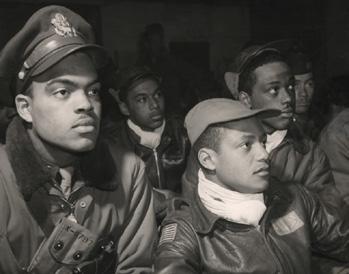
The African American Military Experience: From Revolution to Civil Rights
John Langellier, Tues 10/7 through 11/11. 7 to 8:30 p.m. Online via Zoom
African Americans have served in every US military conflict, fighting for both their country and their own rights. From Black patriots in the Revolutionary War to the 180,000 African Americans who fought for the Union in the Civil War, their contributions have shaped American history. After the war, Black soldiers gained congressional approval to enlist in the peacetime Army, leading to the formation of the “Buffalo Soldiers.”
This course traces their service from the War of 1812 to World War II, highlighting their valor in conflicts abroad and their struggle against segregation and discrimination at home. It is the story of their resilience, sacrifice, and fight for equality in a nation that often failed to recognize their service.
Creative Conservation
Stephanie Arne, Wed 10/8 through 11/12. 5 to 6:30 p.m.
Online via Zoom
Become educated, entertained, and empowered to become more effective stewards of the natural world. Through real-life conservation stories—drawn from the instructor’s personal experiences and her time as host of Mutual of Omaha’s Wild Kingdom—we will highlight the impact of passionate individuals working together to address complex environmental challenges.
This course explores how diverse perspectives and unique skills contribute to conservation efforts, offering students practical ways to take meaningful action in protecting wildlife and ecosystems.
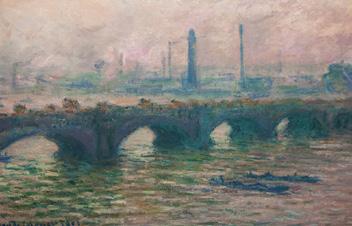
Impressionism: Color Light and Leisure
Lauren Weingarden, Thurs 10/9 through 11/13. 3 to 4:30 p.m.
Online via Zoom
Impressionist painters revolutionized art with a new style that emphasized changing atmospheric effects and luminous color harmonies. Their unblended brushstrokes of pure color and simple compositions broke dramatically with traditional pictorial techniques.
Rejecting historical, mythological, and religious themes, they instead focused on the rapidly shifting aspects of modern life—capturing scenes from the countryside, the home, and the city.
This course examines the work of Monet, Renoir, Degas, Cassatt, and Morisot from the 1860s to the 1910s, exploring their stylistic and technical innovations, personal lives, and the cultural forces shaping their artistry. Students will gain an enhanced ability to experience nature and artistic depictions of it with a newly developed sensory, coloristic, and immersive awareness.
Legendary Shipwrecks of the Great Lakes: Tales From the Inland Seas
Anna Lardinois, Thurs 10/9 through 11/13. 7 to 8:30 p.m.
Online via Zoom
Beneath the surface of the Great Lakes lie thousands of shipwrecks, each with a story to tell. This course brings these lost vessels back to life through vivid storytelling and historical exploration.
We’ll examine the tragic sinking of the Lady Elgin, the haunting legacy of the Eastland, the mystery of the Western Reserve, and the enduring legend of the Edmund Fitzgerald, along with other unforgettable wrecks that shaped Great Lakes history. More than just maritime history, this course uncovers the human stories behind these disasters, the forces that doomed them, and the myths that linger today.
The Films of John Cassavetes and Gena Rowlands: Innovation in Filmmaking and Performance
Heather Brown, Fri 10/10 through 11/14. 11 a.m. to 12:30 p.m.
Online via Zoom
This course explores the groundbreaking collaborations between John Cassavetes and Gena Rowlands, two of the most influential figures in independent cinema. Cassavetes revolutionized American filmmaking with his raw, character-driven storytelling, while Rowlands’ deeply expressive performances are among the most mesmerizing in film history.
We will examine Cassavetes’ unconventional filmmaking methods, including handheld cinematography, long takes, overlapping dialogue, and spontaneous performances. Rowlands’ emotionally intense acting style will be analyzed through her landmark roles in A Woman Under the Influence (1974), Opening Night (1977), and Gloria (1980)
We’ll also explore the collaborative nature of Cassavetes’ productions, his rejection of Hollywood conventions, and his lasting impact on contemporary filmmaking. Students will gain a deeper understanding of how Cassavetes and Rowlands redefined cinematic storytelling with emotional depth and authenticity.
Inequality and Economic Policy
Geoffrey Woglom, Tues 10/14 through 11/18. 1 to 2:30 p.m.
Online via Zoom
Economics plays a central role in every aspect of society. This course examines the causes and potential solutions to inequality in the US from an economic perspective. We will explore the history of different types of inequality, the underlying data and evidence, and the policy levers available to address these issues. Each lecture, led by a subject matter expert with a PhD in economics, will stand alone. Topics may include climate change, healthcare economics, economic inequality, economic mobility, discrimination in public policy, and the wealth gap.
Peeking Inside the Black Box
Johnnie Hendrickson, Tues 10/14 through 11/18. 3 to 4:30 p.m.
Online via Zoom
Have you ever felt like scientists are constantly changing their minds? Do you wonder when research can be trusted to guide decisions about health, behavior, or the environment?
This course offers a behind-the-scenes look at the scientific process, exploring how modern science developed, what scientists actually do, and what makes research reliable. We will examine the strengths and weaknesses of scientific methodology, uncover common pitfalls, and identify red flags for pseudoscience and untrustworthy findings. Rather than relying on blind faith in science, we will learn how to evaluate research critically—and find trust in the process.
American History in Six Songs (Approximately)
Matt Jennings, Tues 10/14 through 11/18. 5 to 6:30 p.m.
Online via Zoom
Whether you’re in Macon, Memphis, Muscle Shoals, or Massapequa, music matters, and our varied musical heritage is one of the best ways to understand crucial moments in American history. This course will explore Indigenous expressions, colonial invasion, forced African migration, and the cultural shifts of the 19th, 20th, and 21st centuries. Through the interplay of genres and traditions, we’ll examine how music captures the evolving American experience.
Alexander Graham Bell and the Telephone: 150 Years Later
Walter Bernard Carlson, Wed 10/15 through 11/19. 11 a.m. to 12:30 p.m.
Online via Zoom
More than any other invention of the past 150 years, the telephone has transformed how we communicate and conduct business. But how was it invented, and why did it have such a profound impact?
This course explores Alexander Graham Bell’s groundbreaking 1875 concept for transmitting sound over an electric wire, his struggles to commercialize the telephone with his father-in-law, Gardiner Hubbard, and his rivalry with inventors Elisha Gray and Thomas Edison. We will also examine the rise and fall of AT&T as a corporate giant and the evolution from wired networks to today’s cellular and smartphone technologies.
Public Health in Action: Addressing Stress, Equity, and Solutions
Faith Ogungbe, Wed 10/15 through 11/19. 7 to 8:30 p.m.
Online via Zoom
In this course, students will explore the social determinants of health, the physiological mechanisms of stress, and the effects of stress on health and well-being. They will also examine stress- and health-related theoretical frameworks. Through this course, students will gain an understanding of the factors that influence health and engage in discussions on the importance of equitably promoting health and wellbeing across populations.
In Darwin’s Footsteps: A Journey to the Galapagos
Eric Simon,
Thurs 10/16 through 11/20. 11 a.m. to 12:30 p.m.
Online via Zoom
From 1831-1836, Charles Darwin circumnavigated the globe aboard the HMS Beagle. In the Galapagos Islands and elsewhere, Darwin collected data that, after decades of study and reflection, formed part of the basis for his publication On the Origin of Species. The ideas presented in that volume remain the foundation of all modern biological thought. Drawing upon original source materials and the instructor’s photos, this course will present the historical and cultural context of Darwin’s era, follow the five-year journey, discuss how Darwin came to his ideas, and explain his theories in detail.
Languages of the World
Asya Pereltsvaig, Thurs 10/16 through 11/20. 1 to 2:30 p.m.
Online via Zoom
Explore the world’s linguistic diversity. With more than 7,000 languages spoken today, their variety offers insight into the evolution of human language, thought, and civilization.
This course examines how languages develop, change, and interact over time. Through a journey across six mystery locations—one per week—we will uncover the historical relationships among languages and the migrations, splits, and connections that have shaped them. By studying the languages spoken in these regions, we will gain a deeper understanding of human history and what it means to be human.
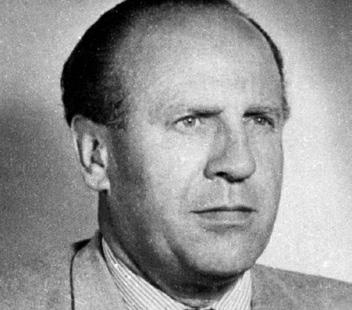
The Power of One in Steven Spielberg Films
Bernard Epps, Mon 10/20 through 11/24. 1 to 2:30 p.m.
Online via Zoom
In Steven Spielberg’s Academy Award-winning Schindler’s List (1993), a character quotes from scripture: “He who saves a life saves the world entire.” Through scene-by-scene analysis, this course explores variations on this theme across a selection of Spielberg films.
With a focus on dialogue and action that reveal characters’ inner beliefs and moral choices, we will examine how the world is saved—or not. We will analyze the following films: Close Encounters of the Third Kind, Lincoln, Bridge of Spies, Saving Private Ryan, Munich, and Schindler’s List.
Graceful Exits: Exploring the Economics, Ethics, and Ethos of Death With Dignity
Aleen Bayard, Mon 10/20 through 11/24. 5 to 6:30 p.m. Online via Zoom
This course explores the complex issue of Death with Dignity, also known as assisted suicide, through its historical development, ethical debates, legal frameworks, and cultural perspectives. The movement gained national attention through the advocacy of Dr. Jack Kevorkian, sparking widespread discussion on end-of-life choices.
Students will critically examine evolving policies on physician-assisted suicide and euthanasia while engaging in thoughtful discussions on this sensitive and often controversial topic. Designed to educate and foster awareness, this course provides a comprehensive look at the ethical and legal dimensions of end-of-life decision-making.
The Magic of Motown
Mike Agron, Tues 10/28 through 12/2. 11 a.m. to 12:30 p.m.
Online via Zoom
Explore Motown’s golden era from the late 1950s to the 1970s, a period marked by groundbreaking songwriting, iconic artists, and profound social influence. Discover how Motown’s innovative production methods shaped its timeless sound, broke racial barriers, and adapted to shifting cultural landscapes to achieve worldwide acclaim. Featuring legendary artists and curated tracks and videos, this course concludes with a celebration of Motown’s transformative first 25 years. Join us to experience the enduring magic of Motown and its lasting impact on music and culture.
Meet the Instructors
Osher Online instructors are indicated with the abbreviation (OO) next to their name
Mike Agron (OO)
Mike Agron grew up in Los Angeles, the heart of the recording and entertainment industry. He loved music so much that he wanted to become a recording engineer. Fate had different plans, and Mike ended up with a successful career in hi-tech, including founding a webinar marketing agency. He has fulfilled his musical and entertainment passions by offering his varied and uniquely popular seminars to learners across the country.
Stephanie Arne (OO)
Stephanie Arne is an international wildlife conservationist, expedition guide, and storyteller. She is the former host of Mutual of Omaha’s Wild Kingdom and has appeared on Animal Planet, The Weather Channel, The Harry Connick Jr. Show, and The Drew Barrymore Show. Stephanie’s expertise in wildlife conservation has earned her a seat on the Association of Zoos and Aquariums’ Lion SAFE (Saving Animals from Extinction) committee and the International Union for Conservation of Nature’s (IUCN) Education and Communication Commission.
John F. Akwetey, MSc
John Akwetey is an experienced evaluator with over 12 years of expertise in designing, planning, and leading evaluations across various sectors. He is currently pursuing an Interdisciplinary Ph.D. in evaluation at Western Michigan University, where he is developing a counterfactual estimation strategy grounded in Systematic Inventive Thinking (SIT) principles. He holds an MSc in development evaluation and management from the University of Antwerp, Belgium, and a BSc in economics and agribusiness management from Central University, Ghana. John has worked on high-impact projects, including evaluations for USAID’s Bureau for Resilience and Food Security and research funded by the Mastercard Foundation on technology-driven Monitoring, Evaluation, Research, and Learning (MERL) solutions. As a member of the American Evaluation Association, EvalForward, and the Ghana Evaluation Forum, John’s interdisciplinary expertise and global experience position him as a leader in the evaluation field.
Robert Balik
Robert Balik is a professor emeritus of finance in the Haworth College of Business at Western Michigan University. Before his career in finance, Robert majored in chemistry during his undergraduate studies before serving in the United States Air Force for six years. His first year was spent taking undergraduate and graduate meteorology courses. Robert’s first duty assignment as a weather officer was at Homestead Air Force base in southern Florida, where, within one month of arriving, he experienced his first hurricane. After two years at Homestead, Robert spent the remaining three years of his military career in Germany.
Aleen Bayard (OO)
Aleen Bayard, Ph.D., is an adjunct faculty member at Northwestern University, teaching leadership and change management. She played a key role in Northwestern’s partnership with the Spertus Institute for Jewish Learning and Leadership, developing the curriculum for the Certificate in Jewish Leadership and teaching in the program for several years. Aleen holds degrees from Stanford University, Columbia University, and Northwestern University and earned her doctorate from Benedictine University. Through her consulting practice, she develops programs on leadership, culture, employee engagement, and team performance.
Wayne L. Bond II
Wayne Bond brings experience working with people from all over the world. His responsibilities at Western Michigan University include being an instructor for the School of Social Work, where he is proud to help develop future social workers. When he is not working or studying, Wayne can be found relaxing with a book or catching up on his favorite shows like Game of Thrones or One Piece. He comes to the instructor position as a member of the millennial generation that helped introduce Anime into mainstream culture within the United States. When he is not reading, Wayne has taken to writing and directing online video essays depicting various themes and lessons within anime.
Andrew Brasosky
Andrew Brasosky is a Western Michigan University alum and former Bronco football player. He grew up on the east side of Michigan and served in the United States Marine
Corps for ten years after graduation. Andrew deployed overseas six times, including three combat deployments, during which he was wounded and decorated two times for valor in combat. Following his service, he relocated to Kalamazoo and began a new career with Stryker prior to transitioning to his current position with Edward Jones. Andrew is married to Elizabeth, a fellow WMU graduate, and they have two children.
Heather Brown (OO)
Heather Brown holds a Ph.D. in English with a concentration in rhetoric and composition from the University of Maryland and an M.A. in English from the University of North Carolina–Wilmington. She has taught courses in academic writing, English literature, language and linguistics, women’s literature, feminist theory, and rhetorical criticism. Heather works as a learning designer, specializing in graduate and professional studies programs, including at Northwestern University. She is also an adjunct associate professor of academic writing at the University of Maryland Global Campus.
April Bryan
April Bryan, a member of the Air Zoo’s team of world-class educators and docents, joins us as an OLLI instructor this semester. April is the Air Zoo’s Exhibits and Interpretation Manager, and she is responsible for overseeing their exhibit and collections programs. The Air Zoo’s education programs are focused on creating interactive educational programs that not only stimulate and engage audiences during their presentation, but also inspire them to continue their exploration of science and history long after the program’s conclusion. Volunteer docents are trained members of the community who are passionate about aircraft, history, teaching, and the Air Zoo. These docents, some of whom are retired pilots and teachers, veterans, local history buffs, and students, are all here to inspire and educate guests about the museum’s collection of aircraft, spacecraft, and artifacts.
Sue Caulfield
Sue Caulfield has taught at the university level for 38 years, 32 of which were spent at Western Michigan University. She has a Ph.D. in criminology and a master’s in spirituality, culture, and health, as well as graduate certificates in both holistic health and spirituality, culture, and health. For her master’s degree, Susan’s focus has been on death, dying, and spiritual assessment, and she is currently co-editing
an anthology on these topics. Sue will retire from WMU in the next few years, after which she plans to open her own business as a death planner and educator.
Sharon Carlson
Dr. Sharon Carlson retired from Western Michigan University in 2020 after heading the Zhang Legacy Collections Center. She is currently serving as the President of the Board of the Historical Society of Michigan. Sharon’s interests focus on regional history.
Walter Bernard (Bernie) Carlson (OO)
Bernard (Bernie) Carlson is a Vaughan Professor Emeritus of Humanities at the University of Virginia and an expert on invention, entrepreneurship, and the role of technology in society. He has received the Sally Hacker Prize from the Society for the History of Technology and the William Middleton Prize from the Institution of Electrical and Electronics Engineers. Bernie has also filmed “Understanding the Inventions that Changed the World.” Now based in Ireland, he directs the M.S. program in AgInnovation at the University of Galway, where he trains adult learners in product development, startups, and sustainable farming.
Dr. Ann Chapleau
Dr. Ann Chapleau is a professor of occupational therapy and Director of the School of Interdisciplinary Health Programs in the College of Health and Human Services at Western Michigan University. Since joining Western in 2008, she has developed numerous classroom and fieldwork courses specializing in mental health practice, including a community-based field placement at the Kalamazoo Psychiatric Hospital (KPH). Her interest in preserving medical records at KPH led to a published study of discharge outcomes from 1945-1954, an archival exhibit, presentations related to the history of OT and other nonmedical interventions at KPH, and the development of an oral history collection of mental health OTs from around the world. Dr. Ann is a Fellow of the American Occupational Therapy Association, an inaugural recipient of the WMU Presidential Innovation Professorship, the CHHS Interprofessional Collaboration Award, and is an invited member of the Occupational Therapy Leaders and Legacies Society.
Instructors Continued
Jennifer Clark
Jennifer Clark is the author of six books, including a children’s book, full-length poetry collections, and a memoir, “Kissing the World Goodbye,” which was named a top-selling book of 2022 by Unsolicited Press. Her latest poetry collection, “Intercede: Saints for Concerning Occasions” (Unsolicited Press), pulls back the curtain to reveal the human side of sainthood, inviting readers to explore deeper truths. Additionally, Jennifer has facilitated a variety of workshops in diverse settings for over 30 years.
Shayla Croteau
Shayla Croteau serves as the Art Registrar and an Educator for the Michigan State Capitol. She holds an M.A. in art history from Case Western Reserve University in Cleveland, Ohio, where she specialized in Renaissance and Baroque art. Prior to graduate school, she studied at Michigan State University’s Residential College in the Arts and Humanities, where she became passionate about museum studies and civic engagement. She has also interned at several museums around Michigan, including the Automotive Hall of Fame in Dearborn and the Broad Art Museum in East Lansing. As the Capitol’s Art Registrar, Shayla catalogs, researches, and creates programming centered around the building’s art collection. She also helped create a website for the Capitol’s art department (mscarts.com) by writing an analysis of each piece in the portrait collection.
Thomas Dietz
Thomas Dietz is the retired Curator of Local History at the Kalamazoo Valley Museum. He has a master’s degree in American History from Wayne State University and was a part-time instructor in the history department at Western Michigan University for many years. Thomas has taught numerous OLLI courses on both local and American history, as well as a diverse range of other topics.
Bernard (Butch) Epps (OO)
Bernard (Butch) Epps earned his undergraduate degree from Loyola Marymount University, graduating cum laude as an award-winning film production major. He received his MFA from the UCLA School of Film and Television’s graduate Producers Program, where he specialized in story development and working with screenwriters. At UCLA, Butch served as academic liaison to the MFA Producers Program faculty, including studio heads, development executives, and industry professionals. He has also taught film appreciation courses with a strong emphasis on story analysis.
John B. Fink, Ph.D.
Dr. John Fink joined the mathematics faculty at Kalamazoo College in 1975 and taught there for the next four decades. He has held visiting positions at several universities in the United States and at Oxford University in England. In 2001, the Michigan Mathematics Association awarded him its prize for Distinguished Teaching. Dr. John began his career as a Fulbright Scholar at the University of Tübingen in Germany; towards the end of his career, he was a Fulbright Lecturer and Senior Specialist at Universidad San Francisco de Quito in Ecuador. In Kalamazoo, he was a founding instructor for Kalamazoo’s Academically Talented Youth Program (ATYP). Two decades later, Dr. John developed and ran Keep the Doors Open, a mathematics enrichment program, with support from the Howard Hughes Medical Institute for promising middle school students, primarily from Kalamazoo’s Northside and Edison neighborhoods. He retired from Kalamazoo College as Rosemary K. Brown Professor of Mathematics in 2016.
Dr. Kathy Gadwood, MD
Dr. Kathy Gadwood is a retired board-certified radiologist with 36 years of experience who served for 32 years with Kalamazoo Radiology before joining Advanced Radiology Services. She sub-specialized in the uses of diagnostic ultrasound, and over the years has taught medical students, residents, and technologists. Dr. Kathy always appreciated the fact that the discipline of radiology involves lifelong learning, and it seems that this learning continues even in retirement!
Sam Grossman
Sam Grossman is a retired pediatrician and former college professor from Kalamazoo. His lifelong interest in photography as an artform inspired Sam to become a darkroom photographer and, after retirement, he trained as a docent at the Kalamazoo Institute of Arts. In addition to participating in the KIA’s Art Break program, Sam has led numerous tours and enjoys teaching small groups in the gallery using an interactive teaching style called Visual Teaching Strategies (VTS). Sam has also taught many courses for OLLI at WMU, sharing his extensive knowledge about art and a range of other topics as a frequent instructor.
Allison Hammond, Ed.D.
Allison Hammond, Ed.D., provides opportunities to help families avoid confusion, conflict, and chaos as parents age. As a Visual Facilitator, Dr. Allison has conducted numerous Visual Facilitation Sessions for people with disabilities, youth, small businesses, non-profits, and families of all kinds. She has a doctoral degree in Education Leadership from Western Michigan University, and her visual facilitation training includes MAPs and PATHs through the Inclusion Network, Charting the Life Course at the University of Missouri–Kansas City, and The Agerbeck Method in Chicago.
Diane and Stan Henderson
Diane and Stan Henderson are avid readers—Stan reads history, Diane fiction. In other lives, they would have been History and English professors. Now they team up to share their passions with us. Pre-retirement, Stan was the Vice Chancellor for Enrollment Management and Student Life at the University of Michigan-Dearborn, and Diane was an educational program planner and consultant. They say they are now both “failing” retirement!
Johnnie Hendrickson (OO)
Dr. Johnnie Hendrickson is a teaching professor in the School of Molecular Sciences at Arizona State University; he holds a Ph.D. in chemistry and is the author of the textbook “Chemistry in the World.” Dr. Johnnie’s academic work focuses on science communication, which is the reciprocal relationship between science and society.
McGwire Hidden
McGwire Hidden has taught or co-taught both Western Michigan University undergraduates and OLLI students about existentialist philosophy, phenomenology, and the history of philosophy. In addition to providing instruction to traditional students at WMU’s main campus in Kalamazoo, McGwire also shares his knowledge with some of the University’s newest students at the Lakeland Correctional Facility in Coldwater, Michigan.
Lynn Houghton
Lynn Houghton is the Regional History Curator at the Zhang Legacy Collections Center. She is responsible for the proper care and use of archival material relating to Southwestern Michigan. She is the co-author of “Kalamazoo Lost and Found” with Pamela O’Connor and writes entries for the “My Five Favorites” series found in Encore magazine. She has a bachelor’s and a master’s degree in history from Western Michigan University and a master’s in library and information science from Wayne State University.
Chase Imberger
Chase Imberger’s lifelong dedication to assisting others has evolved into concentrating on guiding individuals towards achieving a secure and fulfilling retirement. His degree in finance and economics, in addition to his professional designations, has helped him hone his skills and knowledge. When not meeting with clients to discuss personalized goals, Chase fulfills his vision of educating and empowering others by hosting various financial wellness seminars and participating in community outreach efforts.
Matt Jennings (OO)
Matt Jennings, Ph.D., is professor of history at Middle Georgia State University. He has authored several books on Native American and local history, including “New Worlds of Violence,” “The Flower Hunter and the People,” and “Ocmulgee National Monument: A Brief History with Field Notes” (with poet Gordon Johnston). While he specializes in Native American history, Matt teaches in a variety of fields, including the history of music in America (perhaps as a way of compensating for his sporadic, and sophomoric efforts on the guitar, mandolin, and banjo).
Ron Kramer
Ron Kramer is a longtime peace and social justice activist and a professor in Western Michigan University’s Department of Sociology. Ron and fellow OLLI instructor Don Cooney are also co-hosts of the award-winning Public Media Network television program, “Critical Issues, Alternative Views.”
Instructors Continued
Dwandra Nickole Lampkin
Dwandra Nickole Lampkin is an accomplished actor and professor of theatre with over 30 years of professional experience. She holds a Master of Fine Arts in Acting from the National Theatre Conservatory and has taught university-level theatre courses for 21 years. Dwandra has graced the stages of many theaters across the country, including the Tony Award winning Denver Center Theatre, Indiana Repertory Theatre, Huntington Theatre in Boston, National Black Theatre in NYC, and Cincinnati Playhouse in the Park. Michiganders may have seen her perform at Kalamazoo’s Farmers Alley Theatre or the Purple Rose Theatre in Chelsea. Dwandra’s television credits include appearances on Law & Order, Law & Order SVU, Third Watch, and ABC’s Wonderland. Next, she will be playing the role of Beartrice Albans (the family’s matriarch) in “The House that Will Not Stand.” A seasoned performer and passionate educator, Dwandra continues to inspire both on stage and in the classroom, and she is excited to share her knowledge with our lifelong learners.
Ben Lando
Ben Lando, a 4th generation Kalamazooan, became a journalist more than 20 years ago covering Kalamazoo city and county governments and other community stories for local radio stations and newspapers. Based in Washington, D.C., from 2006 to 2009, he was a reporter and editor for United Press International covering U.S. and global energy, political, and security stories. Ben moved to Baghdad in 2009 as a reporter for The Wall Street Journal, The Economist, Time, and other news outlets. He founded www.iraqoilreport.com, which remains the premier outlet covering economic, security, and political developments. Ben returned home in 2013, started a family, and launched NowKalamazoo in 2019.
John Langellier (OO)
John Langellier has spent decades researching African Americans in the United States military, beginning in the 1960s. His work includes articles and books such as “More Work Than Glory: Buffalo Soldiers in the United States Army, 1866–1916,” “Buffalo Soldiers in Arizona,” and an extensive National Park Service study on Buffalo Soldiers from the Eastern Seaboard to Hawaii. John has consulted and produced documentaries on African Americans in the armed forces for A&E and PBS, curated museum exhibits, developed curricula, and delivered programs across the US and Europe.
Anna Lardinois (OO)
Anna Lardinois is an author, storyteller, and history enthusiast with a passion for uncovering dramatic and often chilling tales from the past. She is the author of “Shipwrecks of the Great Lakes: Tragedies and Legacies from the Inland Seas” (2021) and more than a dozen books on history, folklore, and ghostly legends. Anna founded an award-winning tour company specializing in haunted history and previously served as the Pfister Hotel Narrator, chronicling stories from Milwaukee’s most historic hotel. She has hosted the radio show “Haunted Heartland” and currently leads an online publication focused on entrepreneurship in Wisconsin.
Erin Lewis
Erin Lewis, a member of the Air Zoo’s team of world-class educators and docents, joins us as an OLLI instructor this semester. The Air Zoo’s education programs are developed by licensed Michigan teachers who are focused on creating affordable, interactive educational programs that not only stimulate and engage audiences during their presentation, but also inspire them to continue their exploration of science long after the program’s conclusion. Volunteer docents are trained members of the community who are passionate about aircraft, history, teaching, and the Air Zoo. These docents, some of whom are retired pilots and teachers, veterans, local history buffs, and students, are all here to inspire and educate guests about the museum’s collection of aircraft, spacecraft, and artifacts.
Valerie Marvin
Valerie Marvin is honored to serve as the Historian and Curator of the Michigan State Capitol, a National Historic Landmark. She graduated from the University of Michigan in 2005 with a Bachelor of Arts in Russian Studies and earned her Master of Science degree in Historic Preservation from Eastern Michigan University in 2009. Valerie lives with her husband David in a historic home built in 1906 in downtown Lansing.
Susan Mastenbrook, NP-C
Susan Mastenbrook, NP-C, is a Nurse Practitioner at Ascension Borgess Hospital’s Borgess Heart Institute. She is a board-certified Nurse Practitioner who provides cardiology care to adults with a special interest in women’s heart care. Susan strives to provide compassionate cardiac care, listening to patients’ goals and partnering with them to design and achieve an ideal health plan that can be worked into their individual lifestyle.
Outside of the office, she enjoys traveling, spending time with family, downhill skiing, boating, and paddle boarding.
Dini Metro-Roland
Dini Metro-Roland is a professor of educational foundations at Western Michigan University. He is also the coordinator of graduate programs in WMU’s Teaching, Learning and Educational Studies department, and serves as the course director of Humanities for Everybody, a program that provides free humanities courses to members of the Kalamazoo community. Dini’s scholarly interests explore themes of multicultural education, philosophical hermeneutics, virtue ethics, and the moral and pedagogical implications of online instruction. His recent publications include “Why Teaching Matters: A Philosophical Guide to the Elements of Practice” (Bloomsbury Academic Press, 2020), coauthored with Paul Farber; and “Moral Education and Technology” in The Oxford Encyclopedia of Philosophy of Education (2022), also co-authored with Paul Farber. Additionally, Dini is a co-editor, with Sheron FraserBurgess and Jessica Heyback, of “The Cambridge Handbook of Ethics and Education” (Cambridge, 2024).
Lem Montero
Lem Montero believes everyone has an incredible story to share, and for most of his professional life, he has helped people and organizations share those stories through articles, photographs, and videos. First a writer, then the editor for West Michigan Senior Times, Lem saw first-hand the need to capture the experiences of older generations while also empowering them to share their own views on the world, and he is excited to help people use today’s technology to leave insightful stories for tomorrow. He currently serves as the Community News Director at the Public Media Network (PMN), a nonprofit community media organization dedicated to helping individuals develop their storytelling abilities, preserve personal and collective narratives, and engage with local media by providing training opportunities, storytelling workshops, community outreach programs, and access to digital production tools.
Niki N. Nimmo, MAT RN
Niki has a master’s degree in teaching and was a certified diabetes educator RN. Her interest in decluttering came after inheriting four households from siblings, parents, and a grandparent—which led her to learn how to downsize spaces—including a 2,300 sq ft house with an accompanying 12x12 ft storage unit into a singular 700 sq ft house. Throughout navigating this sentimental journey, Niki has learned from experience the many ins and outs of the decluttering process.
Shukurani Nsengiyumva
Shukurani Nsengiyumva currently works as a Program Manager with the Alzheimer’s Association, focusing on addressing disparities in dementia care affecting our Black and African American communities in Kalamazoo County. Her background is in community advocacy at the local level, working with families, children, adults, and family caregivers. Shukurani enjoys engaging with the community and advocating for health equity for all. She is also currently pursuing a master’s degree in public health at Western Michigan University’s School of Interdisciplinary Health Programs.
Faith Ogungbe (OO)
Faith Ogungbe is a doctoral candidate in public health at the University of Wisconsin-Milwaukee. She earned bachelor’s and master’s degrees from Northwestern University in anthropology and biotechnology. Faith is deeply committed to health equity and passionate about addressing issues that promote the overall health and well-being of all individuals. Her research interests include maternal and child health in addition to female reproductive health.
Dave Paul
Dave Paul has been teaching philosophy courses at Western Michigan University and elsewhere since 1994. His focus is biomedical ethics, but he has a particular additional interest in existential philosophy. Dave is currently the chair of the philosophy department at WMU and continues to teach undergraduate courses.
Instructors Continued
Miranda Pearson, LLMSW
Miranda Pearson serves as the Regional Coordinator for the Medicare Counseling Program at the Kalamazoo County Area Agency on Aging. She holds a master’s degree in social work from the University of Michigan and has dedicated nearly a decade to supporting the aging community in Kalamazoo. Over the past 5.5 years working with the Area Agency on Aging, Miranda has developed a deep passion for helping older adults navigate the complex resources available to them, ensuring that they receive the care and assistance they deserve. She is steadfastly committed to improving the lives of our older adult population and empowering them to make informed decisions about their own health and well-being.
Asya Pereltsvaig (OO)
Asya Pereltsvaig, Ph.D., earned her degree in English and history from the Hebrew University of Jerusalem and a Ph.D. in linguistics from McGill University. She has taught at Yale and Stanford. An expert in language, history, and their intersections, Asya is the author of “Languages of the World: An Introduction.”
Alex Perrin
Alex Perrin is a Computer Systems Developer with several decades of experience. After graduating with his bachelor’s degree in mathematics at the University of Illinois at Urbana-Champaign in 1988, he worked as a Computer Process Developer for a decade before launching his own business in 2002. At the same time, Alex taught high school math and computer science courses until 2022. He currently serves as the Director of the Speakers Bureau at Rank MI Vote, a Michigan-based volunteer-run, nonpartisan, non-profit organization dedicated to educating Michiganders about Ranked Choice Voting, which allows voters to rank candidates on the ballot in order of their personal preference. Alex was instrumental in leading Rank MI Vote’s policy team in the development of the initial Michigan Ballot proposal to implement Ranked Choice voting as a state constitutional amendment.
Meredith Place
Meredith Place serves as the Kalamazoo County Clerk/ Register of Deeds. As the official “Keeper of the Record,” she is responsible for receiving and safeguarding public records, including, but not limited to, birth, death, and marriage records, property records, and concealed pistol licenses. Meredith also serves as the Chief Election Official of the County and is active with the Michigan Association of County Clerks (MACC) and the Michigan Association of Registers of Deeds (MARD).
Jane Rooks Ross
Jane Rooks Ross is the founding Director of Education for the Kalamazoo Symphony Orchestra and, most recently, established the Marvelous Music program. A lifelong educator, she has taught at Western Michigan University’s Lee Honors College, Kalamazoo Valley Community College, Kalamazoo College, and area schools. Her consulting work includes workshops, grant panels, and writing educational materials, including the popular Listener’s Guide to the Orchestra. Jane holds a M.M. in music education cum laude from Western Michigan University. She was honored with the Community Medal of Arts Award in 2003 and as a YWCA Woman of Achievement in 2018.
Randy Schau
Randy Schau, Kalamazoo’s former deputy city attorney, has been a dedicated OLLI instructor for over eight years. Drawing upon a deep reservoir of knowledge and experiences, Randy’s courses have spanned a wide range of topics, including the history of baseball, television, and music; fascinating facts about living things; the internment of Japanese Americans; how the United States got their borders; and many more.
Eleanor Schrader (OO)
Eleanor Schrader is an award-winning educator, speaker, and author who lectures and leads tours worldwide on art and architectural history. She has been named a distinguished instructor at UCLA Extension, where she teaches history of architecture, interior design, furniture, and decorative arts. Eleanor is a Professor Emerita of art and architectural history at Santa Monica College, and she has completed graduate work in fine and decorative arts at Sotheby’s Institute in London and New York. Eleanor has also served as a design review commissioner for the City of Beverly Hills and currently serves on the board of directors of the John Lautner Foundation.
Marc Seifer (OO)
Marc Seifer, Ph.D., is the author of more than 100 articles and a dozen books, including the acclaimed “Wizard: The Life & Times of Nikola Tesla,” “Ozone Therapy for the Treatment of Viruses,” and “Tesla: Wizard at War.” A frequent speaker on Tesla and technological history, Marc has lectured at every International Tesla Conference and has presented at several institutions, including the Federal Reserve Bank of Boston, Lucasfilm’s Industrial Light & Magic, West Point Military Academy, and the United Nations. His work has been featured in many major publications and has appeared on the BBC, NPR, and in “The Tesla Files,” a five-part History Channel series which has aired in 40 countries.
Eric Simon (OO)
Eric Simon, professor of biology at New England College, received his Ph.D. in biochemistry from Harvard University. An avid traveler and award-winning nature photographer, Eric leads educational international trips to destinations including Belize, the Galapagos, Tanzania, Cuba, the Amazon River, and Patagonia. He is also the author of a widely used series of college biology textbooks—with over 2 million books in print—that help teach biology to students in over 40 countries.
Robin A. Skitt
Robin A. Skitt is an expert in quantitative models and statistics who has worked with industry leaders such as Procter & Gamble, Peabody Energy, and Whirlpool. Over the course of his 40-year career, his assignments touched almost every functional business area, including government relations. Upon retiring, Robin turned his attention to pursuing his passion for helping others explore new paradigms, new metaphors, and new ways of viewing our world. He believes that we should stop thinking of our environment as a collection of parts with minimal interaction and instead consider approaching problems and solutions through the multi-faceted lens of Complex Adaptive Systems. Robin has also been fortunate to knock many things off his bucket list since retiring—including learning how to ski, fly airplanes, and race sailboats—and has recently taken up horseback riding.
Winston Smith
Winston is a Ph.D. student at Arizona State University, working in the field of robotics. He has published several papers on robotics at top conferences, including the International Conference on Robotics and Automation. Winston has an M.S. and B.S. in computer science from Southern Illinois University Carbondale, and he has been teaching for seven years. His research interests include multi-agent systems, decision theory, and robotic planning.
Carol Steiner
Carol Steiner is a retired principal and teacher. Now she is on the board of Country Dancing in Kalamazoo and leads dances throughout Michigan and northern Indiana. She has worked with various national callers that direct the dancers’ steps and has trained many new callers. Carol believes that dancing should always be fun and feel natural. Her clear and active teaching style will have you moving and smiling right away!
Howard Steiner and Band
Howard Steiner has no ethnomusicology credentials other than being an avid banjo player and an enthusiastic collector of musical history. He hosts jam sessions and house concerts featuring old-time string band musicians, occasionally plays in bands for contra/square dances, and attends old-time music festivals where he delights in learning different versions of tunes.
Gillian Stoltman, Ph.D., MPH
Gillian Stoltman, Ph.D., MPH, is a microbiologist, public health epidemiologist, and the former Director of Communicable Disease Control and Immunization at the Michigan Department of Community Health. Gillian has served on numerous national and state committees seeking ways in which communities and governments can limit the impact of diseases such as influenza, smallpox, and more recently, COVID-19. She believes in the importance of communities and individuals understanding the science and policy implications of public health interventions in order to protect themselves, their families, and their communities.
Instructors Continued
Douglas W. Stowell
Douglas Stowell is a veteran in the world of consumer and political polling in both the United States and European Union markets. His career includes serving in such roles as Market Research Director for the Xerox Corporation; U.S. Clients Director for the NOP, Ltd. polling firm in London; and Senior Polling Executive for Wirthlin Worldwide in Washington, D.C. In 2008, he launched Market Resource Associates, which conducts opinion polls on issues in the United States and globally. Douglas is also a member of the Furman University OLLI in Greenville, South Carolina, and conducts virtual Zoom programs for more than 80 organizations worldwide.
Phil D. VanderWeg
Phil D. VanderWeg started his academic training at Albion College, where he received his bachelor’s degree before going on to earn his MFA at the University of Michigan. From there, Phil taught and served in a variety of administrative roles at Middle Tennessee State University for over 20 years in addition to teaching sculpture at Michigan’s Interlochen Arts Camp for five summers. He then led Western Michigan University’s School of Art as both the Director and a professor for another 15 years. Over the span of 40 years total, Phil has been selected to showcase his work at more than 100 regional, national, and international exhibit venues and has completed over 50 private and corporate commissions. Additionally, he is an active member, presenter, and panelist with FATE (Foundations in Art Theory and Education), the National Council of Art Administrators, and the National Association of Schools of Art and Design.
Amy Walker
Amy Walker, a member of the Air Zoo’s team of world-class educators and docents, joins us as an OLLI instructor this semester. The Air Zoo’s education programs are focused on creating affordable, interactive educational programs that not only stimulate and engage audiences during their presentation, but also inspire them to continue their exploration of science and history long after the program’s conclusion. Volunteer docents are trained members of the community who are passionate about aircraft, history, teaching, and the Air Zoo. These docents, some of whom are retired pilots and teachers, veterans, local history buffs, and students, are all here to inspire and educate guests about the museum’s collection of aircraft, spacecraft, and artifacts.
Madison Watland
Madison Watland holds a bachelor’s degree in interactive digital studies with an emphasis on digital imaging and digital advertising from the University of Northern Iowa. As a jack of all trades in media production, she has worked in various fields, including radio, print, design, and social media. Currently, Madison works as the Administrative Assistant for the Osher Lifelong Learning Institute at Western Michigan University. She is passionate about media literacy, education, and safe online habits, while committed to fostering informed communities and promoting sustainable practices.
Lauren Weingarden (OO)
Lauren Weingarden is professor emerita of art history at Florida State University. Her publications explore the interrelations between literature and visual arts in 19th century cultural contexts, and she is the author of several scholarly books and articles about the American architect Louis Sullivan and on French art and literature, particularly Charles Baudelaire and Édouard Manet. Lauren’s interdisciplinary work includes developing an embodied aesthetic model through which art viewers reexperience artists’ immersive encounters with modernity’s fragmentation and nature’s transience—a perspective that deeply informs her teachings on Impressionism.
D. Terry Williams, Ph.D.
Dr. D. Terry Williams is professor and chair emeritus of theatre at Western Michigan University. He has taught script analysis and theatre history for over fifty years and has directed over 100 productions for university, community, and professional theatres. Dr. D. Terry is also a founder and former advisory board member of OLLI at WMU and is a frequent instructor for OLLI.
Reid Williams
Reid Williams is a Kalamazoo resident helping build all aspects of NowKalamazoo’s operations, especially audience engagement, events, and civic programs, in addition to serving as the secretary of the board of directors of The Local Journalism Foundation. Reid has built his career in the field of journalism and media since his first newspaper job in 1999 and has worked as a reporter, editor, and photographer. In Michigan, he was the Regional Digital News Director supervising the Lansing State Journal, Battle Creek Enquirer, and Port Huron Times Herald; and was Vice President of Innovation and Product Development for the Detroit Free Press and Detroit News. Most recently, Reid worked at USA TODAY, leading a team of journalistsoftware developers.
Ronald Winter
Ron Winter is an associate professor emeritus from Western Michigan University and was the Director of Campus Recreation for 23 years. He is a graduate of Michigan State University, a collegiate football official for 19 years in the Big Ten Conference, and a retired referee from the National Football League with 19 years of experience. Ron is a returning OLLI instructor.
Geoffrey Woglom (OO)
Geof Woglom, Ph.D., is professor emeritus of economics at Amherst College, where he taught for over 40 years. He has held visiting positions at Cambridge, Harvard, and the London School of Economics, and was a Fulbright Scholar at both the University of the Western Cape in Cape Town and Nanjing University. Geof has served as an economic consultant for the International Monetary Fund, the Federal Reserve Board, and the Federal Reserve Bank of Boston.
Savannah Xaver, Ph.D.
Savannah Xaver earned her Ph.D. in English with specialization in renaissance drama from Western Michigan University in 2023. Savannah is currently an instructional designer at WMU and teaches first-year writing and Shakespeare part-time. Her focus is on early modern insults, and her dissertation-turned-manuscript investigates the complex lexicon of “strumpet” on stage. Savannah also researches and writes about the violent connotations of feminine metaphor; teaching Shakespeare through adaptation; pregnancy portrayals on the early modern stage; and new strategies for teaching literature asynchronously online. When she is not teaching and researching, Savannah enjoys reading psychological thrillers, watching cooking shows, and going to the zoo with her son at every possible opportunity.
Premier World Discovery 2025 Trips

Black Hills, Badlands & Mt. Rushmore
September 10 to 16, 2025

New England Rails & Trails October 1 to 9, 2025
Visit wmich.edu/olli/trips for additional details
Events

Highlights of the Douro with Spain
November 3 to 12, 2025
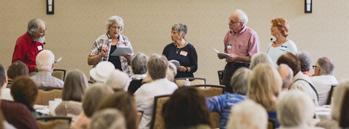
Taste of OLLI Wed, 8/20. 9 a.m. to 1 p.m. (check-in begins at 8 a.m.)
Fetzer Center, 2251 Business Ct, Kalamazoo, MI 49008
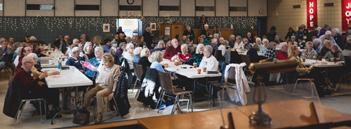
OLLI Annual Meeting Wed, 11/12. 1 to 3 p.m. People’s Church, 1758 N 10th St.Kalamazoo, MI
Shared Interest Groups

Downsize or Declutter for the Life of Me
Niki Nimmo
monthly, please contact the OLLI Office for details

German Language
Gail Ledbetter
Fridays, 10 a.m. to noon, location varies, please contact the OLLI Office for details

Photography
Contact Gillian Stoltman at gillianstoltman@gmail.com or Carole Smith at carolesmith@chartermi.net for information about meeting times, dates, or other questions
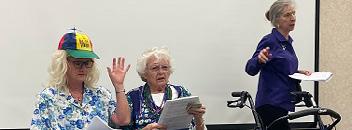
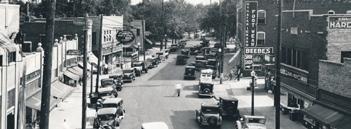
EDISON: The EDucation IS ON - Resident Scholars
Group Dates TBD, 5:30 to 7 p.m.
Goodwill Industries of Southwestern Michigan, 420 E. Alcott Street, 49001
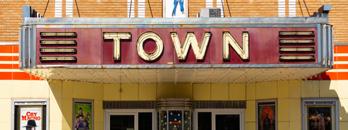
Introduction to Film
Michael Marchak Celebration Cinema, 6600 Ring Rd, Portage, 49024

Play Pétanque Monday Mornings!
Martha Beverly and Stanley Sackett Mondays, 10 a.m. to Noon Kalamazoo Valley Community College Texas Township Campus
Readers Theatre Comes Alive
Sharon Wade, Dr. D. Terry Williams, and Mary VanDerMaas Wednesdays weekly, 1 to 3 p.m. Parkview Hills Clubhouse
facebook.com/wmulifelonglearning


